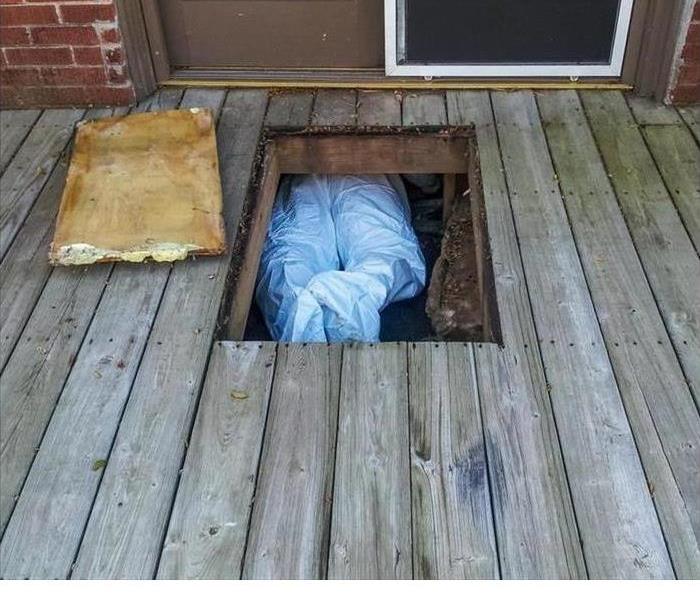Recent Water Damage Posts
Protecting Your Home from Winter Weather: Avoiding Frozen Pipes
1/22/2025 (Permalink)
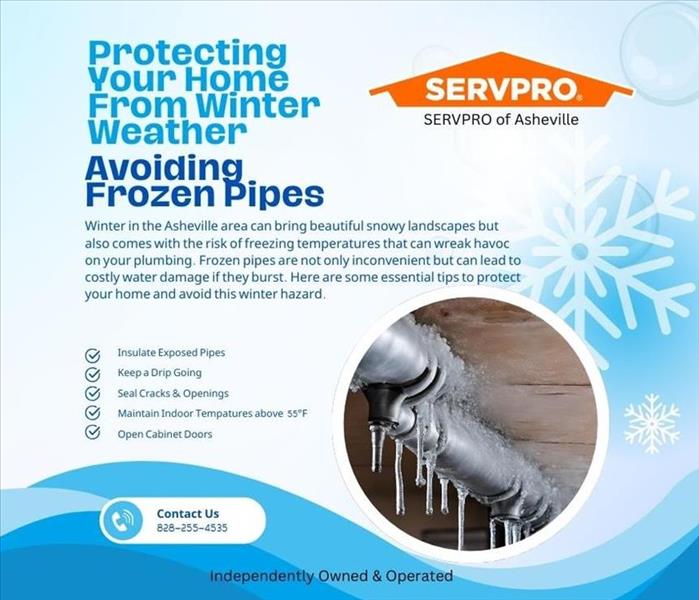 Contact us anytime for assistance. We’re available 24/7!
Contact us anytime for assistance. We’re available 24/7!
Protecting Your Home from Winter Weather: Avoiding Frozen Pipes
Winter in the Asheville area can bring beautiful snowy landscapes but also comes with the risk of freezing temperatures that can wreak havoc on your plumbing. Frozen pipes are not only inconvenient but can lead to costly water damage if they burst. Here are some essential tips to protect your home and avoid this winter hazard.
1. Insulate Exposed Pipes: Make sure all exposed pipes, especially those in unheated areas like basements, crawl spaces, and attics, are properly insulated. Pipe insulation sleeves or heat tape can make a significant difference.
2. Keep a Drip Going: During freezing temperatures, let a small trickle of water run from faucets served by exposed pipes. Flowing water can prevent pipes from freezing.
3. Seal Cracks and Openings: Inspect your home for any cracks or openings that let in cold air, especially around pipes. Use caulk or insulation to seal these areas and keep the cold out.
4. Maintain Indoor Temperatures: Keep your thermostat set to a consistent temperature, even when you’re away. Experts recommend setting it no lower than 55°F to keep pipes warm.
5. Open Cabinet Doors: Allow warm air to circulate around plumbing in kitchen and bathroom cabinets. This simple step can make a big difference during cold snaps.
If your pipes do freeze, act quickly! Turn off the water supply and call a professional to safely thaw the pipes and inspect for potential damage.
At SERVPRO of Asheville, we understand how stressful winter related water damage can be. Our team is here to help with professional water restoration services to get your home back to normal. Contact us anytime for assistance. We’re available 24/7!
Stay safe this winter and take the steps now to protect your home and family.
How to Handle Water in Your Crawl Space
5/3/2022 (Permalink)
The crawl space under your home is probably not an area you visit very often. However, it should be inspected periodically to see if moisture problems have developed. A wet crawl space is something every homeowner in Biltmore, NC, should be concerned about. Keep in mind that “wet” can mean anything from slightly damp ground to standing water.
Determine the Cause of the Moisture
Start with the most obvious potential causes of moisture. Hopefully, you can identify the problem at this juncture. If not, continue investigating other, more obscure possibilities. Here are several things to look for:
- Weather-related flooding
- Clogged roof gutters or poorly positioned downspouts
- Running water near the crawl space opening
- Clogged drainage pipes
- Broken water or sewage pipes
Many of these causes can be determined by visual inspection. If necessary, get help to inspect areas inaccessible to you.
Take Appropriate Action To Remedy the Problem
Determining why the moisture problem exists is the first step in remediation. Next, you’ll need to apply the correct solution.
In many cases, a wet crawl space problem can be resolved by directing water away from your home’s foundation. Proper sloping and drainage are essential to ensure your crawl space stays dry. If your home is closely located next to a neighbor’s home, proper drainage along the fence line can also minimize the chances of runoff water seeping into your crawl space.
In the event of a flood, you may need a sump pump to remove standing water and direct it to an area away from your home. Less commonly, a break in the water line leading to your home or in the sewage line leading away from the home may require city crews to make repairs. Depending on the severity of the problem, the services of a professional cleanup and damage repair company may be needed.
A wet crawl space should never be ignored or minimized. Inspecting this area of your home on a regular basis can help you spot problems before they become serious and require costly repairs.
What Should You Do if a Pipe Breaks in Your Building?
5/3/2022 (Permalink)
 Water damage to a Swannanoa, NC retail store
Water damage to a Swannanoa, NC retail store
When you lead a company, you try to prepare yourself for anything. This should not only include comprehensive business strategies but also how to protect your employees and make the building where you work a safe place. Disasters such as fires, severe storms and floods can take a toll on people, equipment and the structure itself. If you discover bursting pipes in the office, you need to react appropriately to minimize damage and keep your operations running.
Causes of Broken Pipes
You may not spend much time worrying about the plumbing system in your Swannanoa, NC, building. However, if you neglect maintenance and upkeep, you could find yourself contending with bursting pipes and extreme water damage. The following can lead to these issues:
- Too much pressure
- Corrosion
- Frozen pipes
- Moving pipes
Identify the Location
Water damage in Swannanoa, NC is nothing to take lightly. If you discover water on the floors of your office, quickly find the source. If it's a pipe problem, shut the water supply off immediately.
Alert the Professionals
You may not have the time or skill to fix a broken pipe, but a professional water damage remediation team can take care of repairs, cleanup and restoration. You shouldn't wait a moment to get a crew on the job. Cleanup teams can usually respond to your workplace within a few hours of your call. A timely response will reduce the risk of mold growing in the area.
Stay Out of the Area
Ruptured pipes can present a hazardous situation to you and others in the building. Keep away from the water and let the pros take over. If you must be in the building, make sure you do not touch anything electrical if you are near the water.
Bursting pipes can spill a significant amount of water onto the floors and walls of your office. Stop the water and then rely on the pros to successfully complete the restoration process.
What to Expect From Water Mitigation
5/3/2022 (Permalink)
What to Expect From Water Mitigation
The sight of standing water in home or business properties can cause you to feel stressed and panicked. Water in business and residential properties requires professional restoration and mitigation service if you want the issue dealt with promptly and in a way that protects property value. However, your flood damage or other type of water damage likely developed out of the blue, and you may have not had the water cleanup and drying out process in your plans this week. With a greater understanding about what you can expect from the restoration and water cleanup process, you can better prepare yourself for the days ahead.
The Initial Response
Regardless of whether you have flood damage from a major storm or another type of water damage in your property, you should immediately contact a water cleanup crew to assist you. The water mitigation team that you choose to use for this service should have 24-hour availability and should be able to respond quickly. Remember that you may be able to stop some of the water in business or residential properties from increasing while you wait for help to arrive. With flood damage, it is not usually possible for the property owner to prevent more water from entering the space. However, if your water damage is caused by a plumbing leak, you can turn off the property’s main water supply valve. This is just one example of how property owners can respond to the issue of water in business or residential properties in a positive manner.
Drying Out the Water in Home or Business Properties Quickly
As soon as your water restoration and mitigation team arrives, they will immediately take steps to begin drying out the property. Drying the water must be completed promptly if you want to reduce the chance of mold growing in the space. Therefore, your water cleanup crew will usually use extraction equipment designed specifically for this purpose to remove the water from the property. Water in home or business properties is not the only damaging force that you may contend with. Moisture in the air can also cause mold to grow, and it may create a musty odor in your space. Therefore, the drying out process should also include the use of a dehumidifier. The remaining steps in the flood damage or water damage cleanup process can begin as soon as all moisture has been removed from the surfaces and the air in the property.
The Remainder of the Restoration Process
After the water in home or business properties has been removed, you may notice signs of damage throughout the affected area. This may include water stains on tile, drywall or carpeting. Wood surfaces may be warped, and drywall may be deteriorating. These are only a few of the primary types of damage that you may notice after the water cleanup step has been completed, and the restoration team will remove the damaged areas as needed. These surfaces will be replaced with quality materials. In some cases, such as when dealing with stains and musty odors, the surfaces may be professionally cleaned. After the mitigation team has completed the work in your home or business property, your property will be fully restored. All signs of the water issue will be removed.
If you have water in home, you may not be able to live comfortably in the space until the repair work has been completed. When you have water in business properties, you may not be able to conduct your money-making operations. You understandably need the water cleanup and mitigation process completed as soon as possible. There is no time to waste when dealing with any type of water damage, and this is because the risk of mold growth is great. Now is the time to set up restoration work for your property if you are dealing with flood or water damage today. Visit http://www.SERVPROashevilleeast.com for more information on water damage.
Signs of Frozen Pipes in Your Building
9/27/2021 (Permalink)
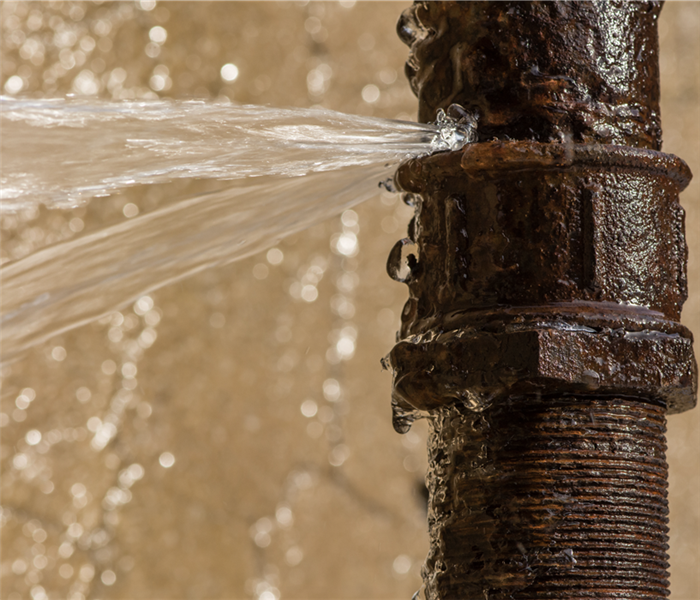 Frozen pipes can be prevented with the appropriate insulation; however, even the best precautions don’t always work.
Frozen pipes can be prevented with the appropriate insulation; however, even the best precautions don’t always work.
If you’re operating a business or managing a property in the Asheville, NC, area then you will likely want to familiarize yourself with issues common in colder climates, especially frozen pipes. Before a freeze leads to broken pipes and water damage, you should familiarize yourself with the signs of frozen pipes to avoid extensive water cleanup and the potential need for restoration specialists.
1. Strange Odors
When pipes freeze, and most likely before any water cleanup is necessary, you may notice strange odors coming from floor drains and faucets. These odors occur because when pipes freeze, especially waste pipes, the ice blocks the areas where gas and other fumes would generally escape. If you begin to smell strange odors coming from areas they don’t typically, you may want to reach out to your local plumbing professionals to avoid any significant issues with water damage.
2. Slow or No Running Water
Additionally, if the water from faucets is slow or not running at all, your pipes may be frozen. Similar to the reasons that odors occur, the free flow of water is obstructed when ice begins to build up in a pipe, causing the water to trickle or stall altogether.
3. The Appearance of Frost on Pipes
In either of the above instances, you can take it upon yourself to investigate, looking in mechanical closets or crawlspaces. If, while investigating, you come across frost on the pipes, this is a sign that you likely have some ice build-up. If not taken care of immediately, the pressure within the pipes may become too great, leading to cracks and breaks in the plumbing.
Frozen pipes can be prevented with the appropriate insulation; however, even the best precautions don’t always work. The best protection, to avoid burst pipes and the resulting water damage, is to remember the steps above, checking your building daily for any possible signs of freezing.
4 Ways Water Damage Can Occur in Your Asheville Home
6/24/2021 (Permalink)
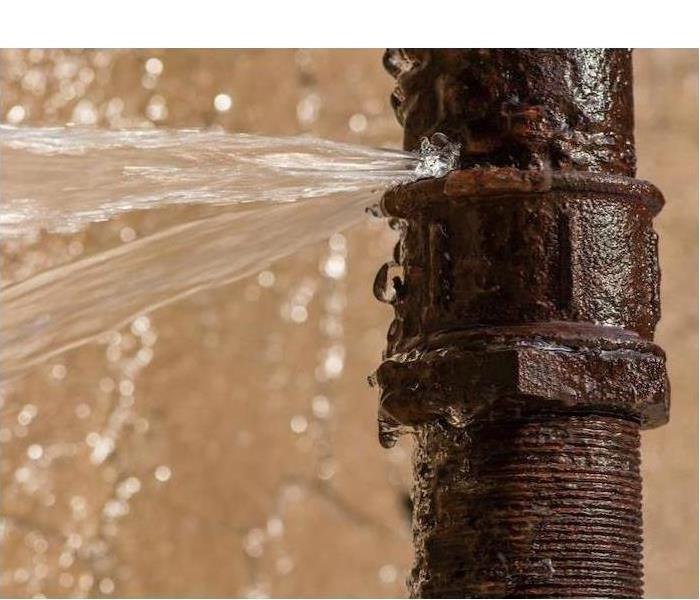 A pipe break can cause serious damage to your Asheville home.
A pipe break can cause serious damage to your Asheville home.
Causes Of Water Damage In Your Home
Homeowners should be aware of the many ways water damage can occur in their homes. When left unattended, water from a pipe burst or leak may require you to call in repair and restoration professionals. To keep your home safe and secure, here are four things you can look for that commonly cause water damage.
1. Malfunctioning Appliances
As your house gets older, so do the appliances. Pipes can rust, hoses can weaken, and the efficiency of your household machines can lower. Deterioration of appliances such as dishwashers, washing machines, and water heaters is a common reason for water damage and flooding. To prevent any sudden disaster, inspect your appliances often.
However, you can’t always prevent appliances from malfunctioning. Water detectors can let you know immediately when something goes wrong. This can help you minimize the damage and clean up the water quickly before the problem gets worse.
2. Bursting Pipes
When sudden pressure occurs in a pipe, there is an increased risk of a pipe burst. This can happen when drains get blocked, toilets get clogged, or when garbage disposals malfunction. Old pipes can burst or leak easily, too. If a problem does occur, shut off the water line quickly and seek professional help.
3. Blocked Gutters
The sole purpose of your gutters is to direct water away from the roof. However, gutters can easily get blocked by leaves, dirt, and branches. This creates a dam in the gutter which prevents water from flowing smoothly down the contraption. When water overflows, it can spill onto the side of the house and soak into the structure.
4. Broken Gutters
Your gutters may not be blocked, but they could be damaged. If there is a crack or break in the material, the water can leak through and cause serious water damage or flooding. You might want to inspect your gutters after heavy storms to check for any damage or blockage.
A pipe burst can cause serious damage. Be sure to keep your home in Asheville, NC, safe and dry by taking precautions against water disasters.
How To Clean Up After a Fairview Sewer Backup
3/15/2021 (Permalink)
 Make sure to turn off the electricity to avoid shocks or fires.
Make sure to turn off the electricity to avoid shocks or fires.
Sewage Cleaning Process
A toilet overflow can be terrible already, but in the case of a clogged pipe and sewage backup, it's much more severe. In addition to potentially causing extensive water damage and secondary damage, sewer water is also extremely unsanitary. You must get the sewage cleaning process underway immediately to avoid as much loss as possible.
Whether hiring water damage cleanup experts or doing it yourself, here's the typical cleaning process after a water disaster involving sewage:
1. Wear Personal Protective Equipment
It's essential to wear PPE while you're handling the cleanup process. The most critical PPE are rubber boots, coveralls, gloves, a respirator and goggles.
2. Shut Off Utilities
Utilities must be shut off before the work begins. This includes electricity, gas and water. If you can't safely navigate to the breaker box or gas shutoff, a professional should be called out to do it. Electricity can flow freely and dangerously through a room where electronics are in the same area as the standing water.
3. Extract Standing Water
A wet/dry vacuum can be a tremendous help during the initial phase of the sewage cleaning process. It can safely, quickly and efficiently extract standing water and smaller debris.
4. Remove Contents
Remove as many belongings as possible from the affected area. Then, separate salvageable items from unsalvageable. Anything that can't be thoroughly cleaned and sanitized and entirely dried within 48 hours may have to be disposed of. Carpet and upholstered furniture are commonly unsalvageable after this type of disaster. Sections of drywall also typically have to be cut out and replaced.
5. Clean and Disinfect
Use a low-suds detergent to clean the area as thoroughly as possible. Don't forget tiny crevices and higher areas where dirty water could've splashed. Then disinfect everything with a sanitizing solution.
6. Dry
Finally, it's critical to dry the entire area and all contents fully within 48 hours; mold can begin growing quickly. Open windows and doors and use dehumidifiers, fans, heaters and exhaust ventilation fans to remove the humidity.
When your Royal Pines, NC, home sustains damage from a toilet overflow, you must begin sewage cleaning immediately. Quick remediation helps to avoid extreme damage.
Steps You Can Take To Avoid Major Plumbing Issues
2/17/2021 (Permalink)
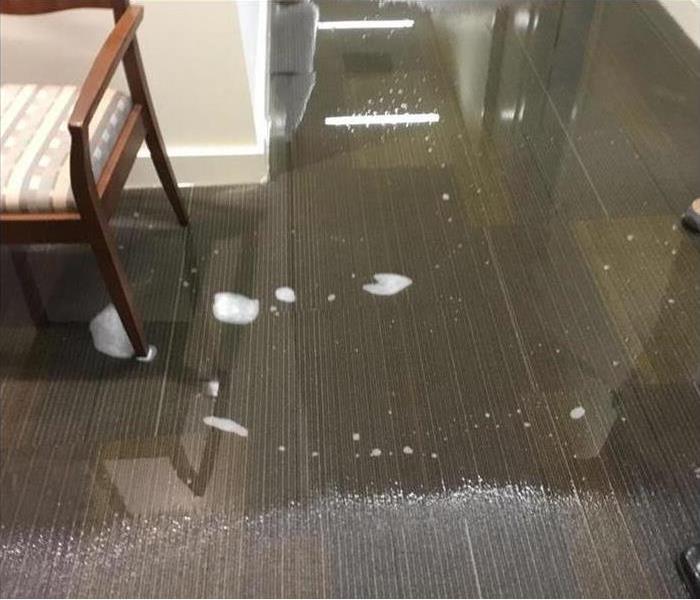 Commercial water damage in Montreat, NC.
Commercial water damage in Montreat, NC.
Implement The Following Four Steps
When a pipe breaks or the toilet overflows, are you prepared to handle the chaos? Do you know who to call? Was there something you could have done to stop the event from happening? Plumbing problems often start small, exacerbating overtime when permitted to linger. Commercial owners in Montreat, NC may not know the signs to look for or how to minimize the travesty. There are ways to do that, but it requires some organization and proactive measures. To avoid a wet mess, owners should implement the following four steps.
1. Remain Aware
A broken pipe likely starts with a tiny crack or pinhole. Proprietors need to remain vigilant about the lines, keeping an eye for anything that changes or is concerning. Make it a habit to walk the property at least once a month. Look at the foundation, walls and ceiling, checking for changes in formation. These alterations could indicate water intrusion. In addition, assess sinks, commodes and appliances, ensuring the work property and do not have any leaks.
2. Rely on Professional Inspections
Don't fix it yourself. Instead, have the name of a specialist who handles plumbing problems. Ask other business owners who they have used, having the information handy. Schedule a yearly overview of your building to see that it's up to code and flowing correctly.
3. Mend Small Problems Immediately
A water main break is a mess. Massive amounts of fluid saturate the rooms, ruining your merchandise and fixtures. This can shut down an establishment until a water remediation company completes repairs. To avoid craziness, tend to concerns immediately. Spending the money on a small repair could save you from a shutdown or major overhaul job.
4. Upgrade the Facility's Lines
During your annual check-in, consider any recommendations, especially about changing parts or enhancing the plumbing structure. Older pipes can become fragile, breaking easily. Paying for sturdy material could reduce the probability of a catastrophe.
Your eyes and your schedule are essential in warding off plumbing problems. Be mindful of what's going on with the structure. Catching things early is a game-changer.
Reasons for Noisy Pipes
1/11/2021 (Permalink)
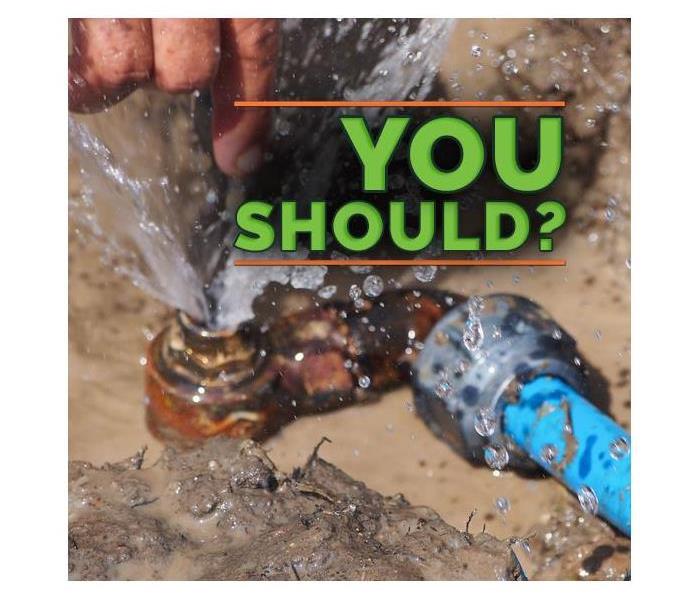 If you have encountered a broken pipe you should fix it right away
If you have encountered a broken pipe you should fix it right away
Reasons for Noisy Pipes
Water damage is a common concern for homeowners because of the rapid and costly damage that ensures from a pipe break or other water issue. With the fear of repairs lurking in their minds, many homeowners worry when they hear strange noises coming from the pipes. While some concern is normal, most noises stem from three fixable problems.
1. Loose Connections
The primary cause of whistling from faucets is not a pipe burst. Instead, the likely culprit is a loose or worn-out washer. You can often correct the problem by tightening the little screw in the handle of the faucet. However, if the noise is coming from multiple sinks and it does not matter which faucet is open, you may want to call a plumbing specialist in Fairview, NC, to have a look.
2. Faulty Ballcock
If you hear a rushing or hissing sound, do not immediately bring the alarm for a pipe break. Many hissing sounds stem from toilet appliances. The most likely cause is a loose or old ballcock in the toilet tank. If you replace the mechanism in the tank, the problem noise should correct itself. If the noise persists, it can speak to another problem deeper in the system, so you would likely want to have it assessed.
3. Rapid Cutoffs
There is one noise that could suggest you need to fix the broken pipe or resolve the problem quickly. If you hear hammering or banging when turning on or off the water supply, you have a rapid shutoff occurring in the system. The constant banging can cause loose connections or leaks if left unresolved.
While homeowners worry about a pipe break or sudden water damage, there is often little to fear from the noises in your pipes. Sounds only indicate that something requires your attention, but that doesn't always equate to costly and time-consuming repairs.
Four Reasons Why Your Toilet Might Be Leaking
11/30/2020 (Permalink)
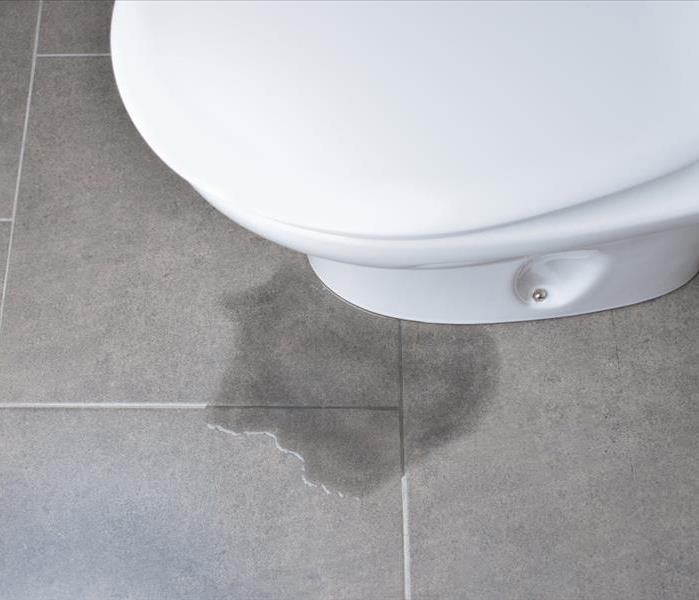 Leaking toilet in Asheville, NC
Leaking toilet in Asheville, NC
What To Do When You Discover A Toilet Leak
If you find a pool of water in your bathroom in Asheville, NC, every time you flush, you might have a leaking toilet. This is not an uncommon problem, and there are a few reasons why it might be happening to yours.
1. A Broken Seal
If there is a pool of water forming at the base of your toilet every time you flush, one of the most common reasons for this is a broken seal. Toilets connect to a pipe opening in the floor called a toilet or closet flange, and the watertight wax seal that keeps them together can eventually dry up and break.
2. Rusty Pipes
Another reason you might have a pool of water around your toilet is rusty and cracked pipes. To check to see if the leak is coming from your pipes or a broken bottom seal, dry up the water on the ground, flush, and note if the water comes from underneath the toilet or from the pipes in the back.
3. Condensation
Sometimes what looks like a leaking toilet really isn't a leak at all. If you notice water on and around the bowl of your toilet, it might simply be condensation from the humidity of your bathroom. To check if this is what's happening, pay attention to when the water forms, as condensation is most likely when you're running a hot shower.
4. A Crack
Even the tiniest cracks in your toilet's tank or bowl can let out enough water to be noticeable. Trace the water back to where it's coming from and then repair your toilet as quickly as possible so that it doesn't grow into a larger, more damaging bathroom leak. If this does happen, however, make sure you quickly call a water damage remediation company to ensure your floors and walls are fully repaired from the damage.
When you discover a leaking toilet, be sure to assess why it's leaking as quickly as possible. This will help you repair your toilet and prevent further damage from occurring.
What To Do If You Notice Water in Your Crawl Space
10/14/2020 (Permalink)
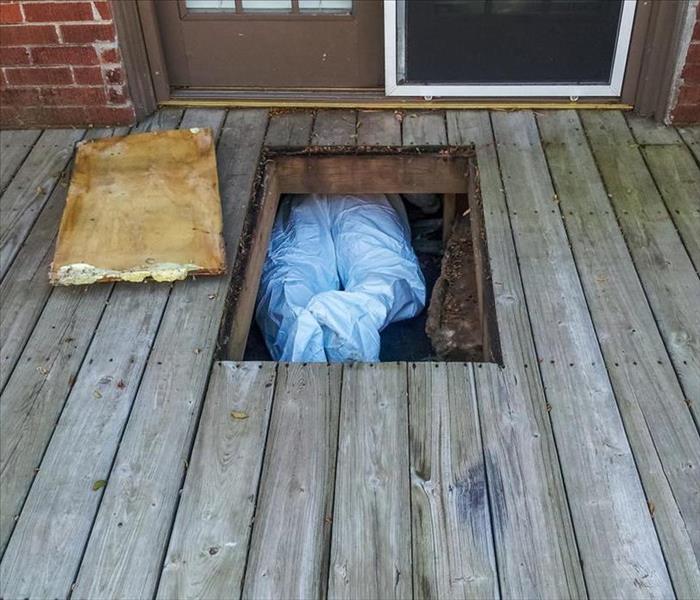 Keep mold from growing in your crawl space by adding a vapor barrier
Keep mold from growing in your crawl space by adding a vapor barrier
The crawl space under your home is probably not an area you visit very often. However, it should be inspected periodically to see if moisture problems have developed. A wet crawl space is something every homeowner in Biltmore, NC, should be concerned about. Keep in mind that “wet” can mean anything from slightly damp ground to standing water.
Determine the Cause of the Moisture
Start with the most obvious potential causes of moisture. Hopefully, you can identify the problem at this juncture. If not, continue investigating other, more obscure possibilities. Here are several things to look for:
- Weather-related flooding
- Clogged roof gutters or poorly positioned downspouts
- Running water near the crawl space opening
- Clogged drainage pipes
- Broken water or sewage pipes
Many of these causes can be determined by visual inspection. If necessary, get help to inspect areas inaccessible to you.
Take Appropriate Action To Remedy the Problem
Determining why the moisture problem exists is the first step in remediation. Next, you’ll need to apply the correct solution.
In many cases, a wet crawl space problem can be resolved by directing water away from your home’s foundation. Proper sloping and drainage are essential to ensure your crawl space stays dry. If your home is closely located next to a neighbor’s home, proper drainage along the fence line can also minimize the chances of runoff water seeping into your crawl space.
In the event of a flood, you may need a sump pump to remove standing water and direct it to an area away from your home. Less commonly, a break in the water line leading to your home or in the sewage line leading away from the home may require city crews to make repairs. Depending on the severity of the problem, the services of a professional cleanup and damage repair company may be needed.
A wet crawl space should never be ignored or minimized. Inspecting this area of your home on a regular basis can help you spot problems before they become serious and require costly repairs.
4 Benefits of Working With a Restoration Company After Water Damage
9/2/2020 (Permalink)
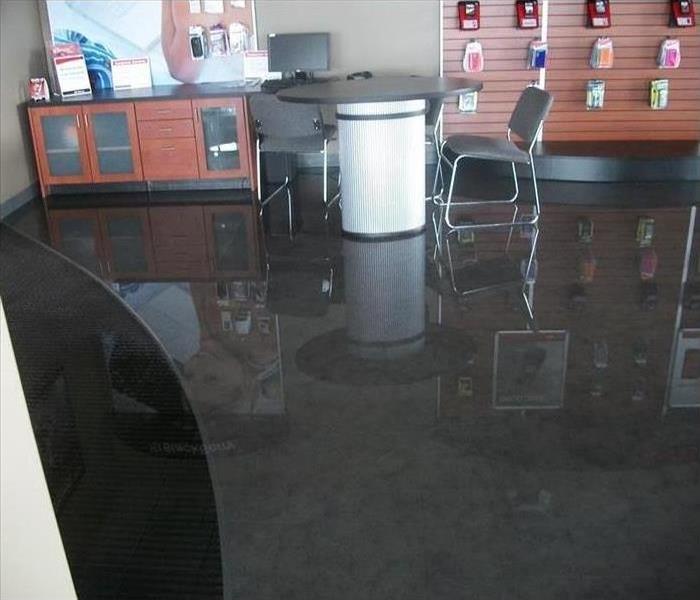 Water damage in Barnardsville, NC
Water damage in Barnardsville, NC
Benefits Of Working With A Professional Franchise
It is definitely not out of the question that your business in Barnardsville, NC, will at some time experience a water problem. You might need a pipe burst cleanup or services related to a sewage backup. Water problems are among the most common issues that companies face. They can be especially difficult to handle. They also can easily cost a business owner thousands of dollars in damages and expenses. Therefore, calling in a qualified water restoration company is a smart move. Here are some of the benefits of working with a professional franchise.
1. They Arrive Faster to Any Size Disaster. A broken pipe in your building qualifies as an emergency. You want a company that can arrive on-site quickly and get right to work mitigating the problem. A professional team can usually arrive at your building in a matter of hours. This doesn't give the water much time to spoil the walls, ceilings, and flooring.
2. They Excel at Pipe Burst Cleanup. An experienced restoration company has seen it all. Technicians will be able to deal quickly with the mess from a burst pipe. A sewer cleanup company will treat the situation safely for its workers and for the employees and customers of your business. The workers know that dirty water contains potentially harmful pathogens. Workers will don PPE as they go about the cleanup process.
3. They Follow High Standards. The cleaning and restoration industry publishes the best practices for cleaning properties impacted by floods, leaks, and other water problems. A professional cleaning company will follow these standards to ensure effective cleanup.
4. They Complete the Job. A complete pipe burst cleanup treats all facets of damage. The technicians will make sure all the water is removed and that secondary impacts are addressed. This could entail replacing damaged drywall and insulation as well as making sure your property is free of mold and mildew.
The Categories of Contaminated Water
5/28/2020 (Permalink)
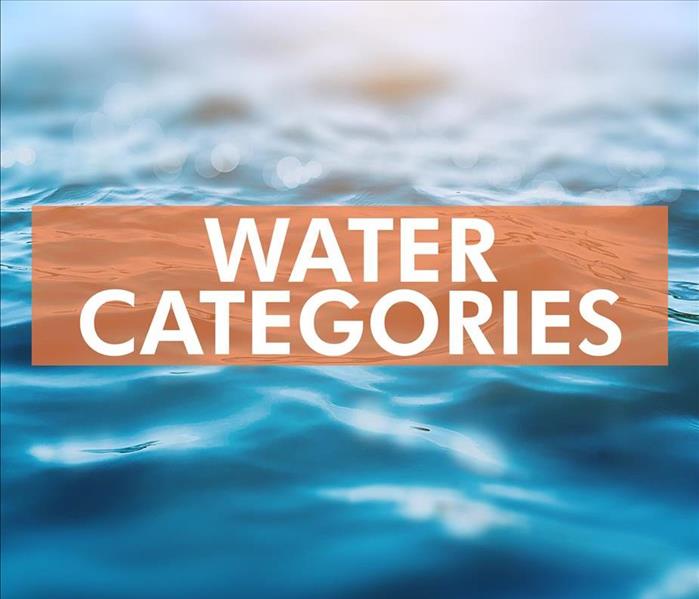 The Categories of Contaminated Water
The Categories of Contaminated Water
Although all water leaks into a home are serious, not all leaks are the same. In fact, many different scenarios can play out when it comes to water damage in Royal Pines, NC. This is why it pays to seek out the services of a qualified water mitigation franchise no matter the issue. Trained workers have the ability and equipment to assess each situation and tailor a plan to remove excess water and to restore the house back to good condition. In the case of contaminated water, the workers will make sure the scene is safe and they will don PPE to protect skin and eyes from exposure to harmful substances.
The Three Levels of Water
When it comes to leaks into a home, it's good to know the source of the water. Professionals categorize water by how clean it is. The following shows the main categories:
- Category 1 water is potable water that comes from a clean source and poses little risk to human health
- Category 2 water is contaminated water that comes from such sources as washing machines and dishwashers
- Category 3 water could come from a flood, a toilet overflow, a sewage backup or another dirty source
Category 3 water is also known as black water because it often looks dark. This type of water should be cleaned up as fast as possible by professional techniques that adhere to the standards of the Institute of Inspection Cleaning and Restoration Certification body.
The Necessity of Quick Action
Whether water damage originates from a supply line that carries clean water or from a sewage line that holds contaminated water, a fast response is crucial. A local company can be at a home in as little as a few hours working to mitigate the problem. Certified workers, specialized equipment, and experience are all needed in the effort to limit damage to a home.
Prevent Water Damage During New Construction
5/13/2020 (Permalink)
Prevent Water Damage During New Construction
New construction in Black Mountain, NC, increases the potential for water damage, and this can cause quite a few problems for commercial property owners:
- Delays in completing the project
- Increased costs for things such as water pipe repair
- Increased debris removal loads
- Damaged reputations of involved professionals
The right preventative steps can reduce the risks.
Pre-Construction Steps
During the pre-construction stage, professionals should run quality control reviews, such as going over plans and specifications, reading through contract documents to find areas of risk regarding water infiltration, and testing the proposed plans for water drainage.
Quality Assurance Procedures
As construction moves forward, it's important that a full-time quality director oversees procedures, as well as developing quality assurance protocols and enforcing them. This includes oversight of any subcontractors. For example, policies regarding the quality of materials can help prevent any broken pipe scenarios. Another example is the creation of a list of issues to review on a weekly basis, such as monitoring the quality of any completed water pipe repair.
Ongoing Inspections and Assessments
Frequent and consistent testing is vital to the prevention of damages, such as a flooded worksite. Water tightness testing, for example, should be performed by a roof testing expert with modern techniques. Low areas in the roofing and other flat surfaces can lead to puddling and water damage as construction materials absorb moisture. Fire protection systems should also be tested according to NFPA 13 standards.
Final Steps at Project Completion
When post-construction tasks are carried out, it's important to assign certain team members to respond immediately as issues are identified. Areas of particular vulnerability include unsecured building openings, building envelope systems, site drainage areas, water delivery, and drainage systems, subsurface drainage, the foundation, and structural elements.
When Prevention Fails
From completing any necessary water pipe repair to consistently inspecting the property for areas of vulnerability, all efforts toward preventing water damage can prevent delays and increase profits. When damages occur in spite of your efforts, water damage remediation professionals can help you get back on track.
Tips for Using a Drain Snake
2/19/2020 (Permalink)
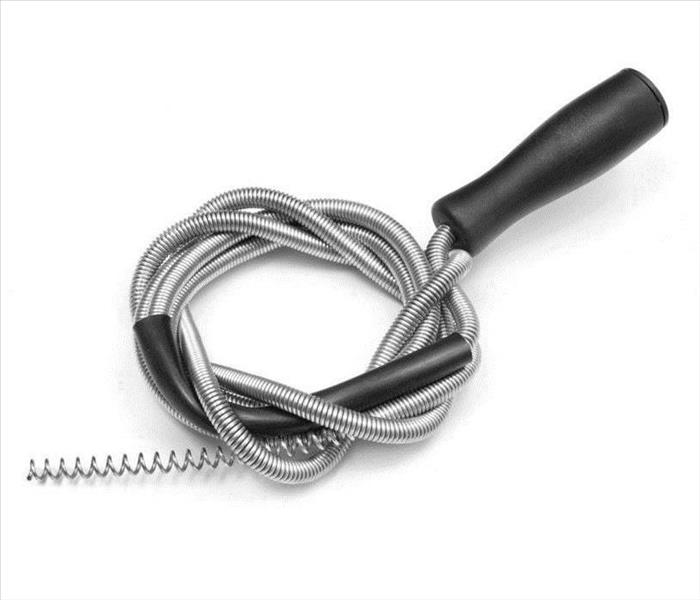 Drain snakes all perform the same function, but they may vary in operation
Drain snakes all perform the same function, but they may vary in operation
Here Is a Guide For Using a Drain Snake
Dealing with clogged pipes in your Biltmore, NC, home is never fun, but it's a crucial task, nonetheless. If you suspect that your home's pipes are obstructed, take action as soon as possible. If too much pressure builds up, it can cause a pipe break. Here is a guide for using a drain snake so you can keep your pipes clean and avoid a costly home repair.
1. Find the right drain snake
Drain snakes all perform the same function, but they may vary in operation. Also called augers, drain snakes are slender, coiled tools that clear clogs in the opposite manner of plungers. Rather than pulling material out of pipes, snakes push into the obstruction and break it up. Drain snakes are long and flexible so they can reach clogs deep inside pipes. Some snakes are handheld; others are drill attachments.
2. Clear the clog
Once you have your drain snake, it's time to clear out your clogged pipes. To start, manually insert the head of the snake into the pipe. Next, use the handle to start uncoiling the snake and continue pushing the snake into the drain until you feel resistance. Go slowly and keep the snake's handle as close to the entrance of the pipe as possible for maximum control and force.
When you encounter the portion that is stopped up, rotate the snake as much as possible. This movement digs into the clog and breaks it up. Continue winding the snake until it uncoils to its full length. When the resistance stops, pull the snake out and run water full-force for a few minutes. If the water moves freely, you have successfully removed the clog.
3. Avoid future stoppages
Keep your pipes clean to avoid future blockages. You can use sink strainers to prevent buildups. If you have a garbage disposal, take care to use it properly. Run cold water while using the disposal and for a minute afterward. This helps ensure that all garbage is thoroughly flushed out of the pipe.
Clearing a clogged drain with a snake can be quite simple. However, some obstructions may require the knowledge and equipment of professional residential cleaners.
What Should You Do if a Pipe Breaks in Your Building?
2/3/2020 (Permalink)
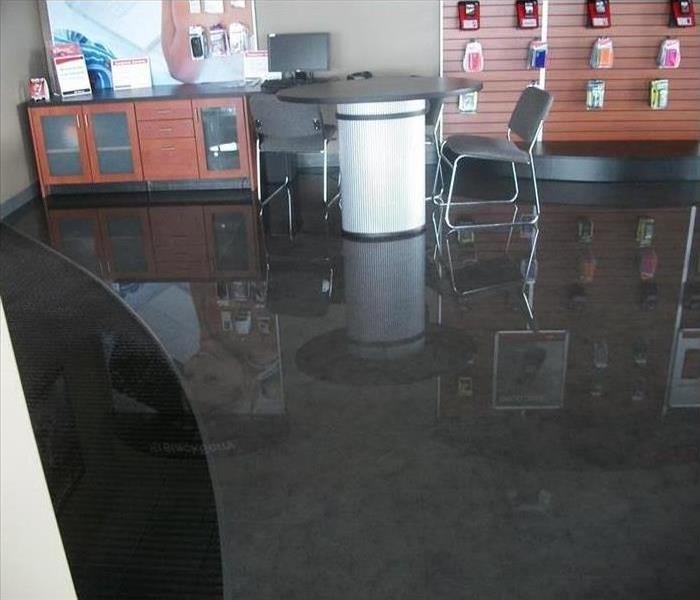 Water damage to a Swannanoa, NC retail store
Water damage to a Swannanoa, NC retail store
When you lead a company, you try to prepare yourself for anything. This should not only include comprehensive business strategies but also how to protect your employees and make the building where you work a safe place. Disasters such as fires, severe storms and floods can take a toll on people, equipment and the structure itself. If you discover bursting pipes in the office, you need to react appropriately to minimize damage and keep your operations running.
Causes of Broken Pipes
You may not spend much time worrying about the plumbing system in your Swannanoa, NC, building. However, if you neglect maintenance and upkeep, you could find yourself contending with bursting pipes and extreme water damage. The following can lead to these issues:
- Too much pressure
- Corrosion
- Frozen pipes
- Moving pipes
Identify the Location
Water damage in Swannanoa, NC is nothing to take lightly. If you discover water on the floors of your office, quickly find the source. If it's a pipe problem, shut the water supply off immediately.
Alert the Professionals
You may not have the time or skill to fix a broken pipe, but a professional water damage remediation team can take care of repairs, cleanup and restoration. You shouldn't wait a moment to get a crew on the job. Cleanup teams can usually respond to your workplace within a few hours of your call. A timely response will reduce the risk of mold growing in the area.
Stay Out of the Area
Ruptured pipes can present a hazardous situation to you and others in the building. Keep away from the water and let the pros take over. If you must be in the building, make sure you do not touch anything electrical if you are near the water.
Bursting pipes can spill a significant amount of water onto the floors and walls of your office. Stop the water and then rely on the pros to successfully complete the restoration process.
Correctly Snaking a Clogged Drain
12/11/2019 (Permalink)
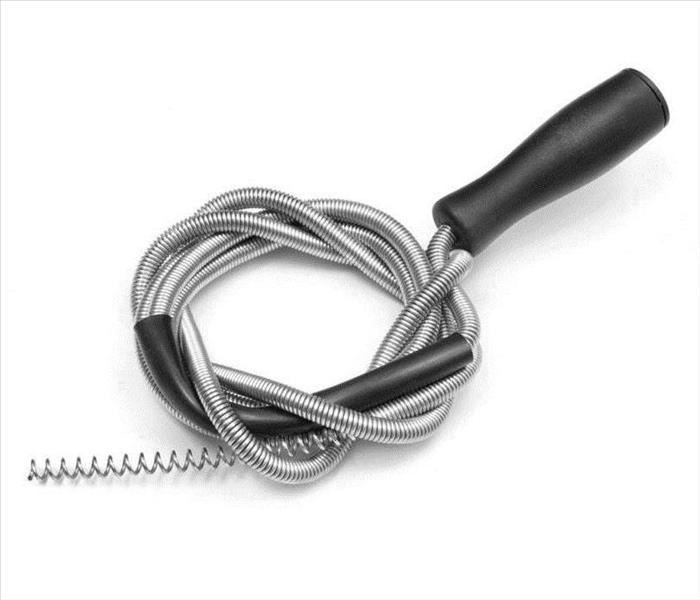 An auger is a coiled line in a drum body, and it typically has a spiral head on the end
An auger is a coiled line in a drum body, and it typically has a spiral head on the end
Basic Four Step Process
A clogged drain is a frustrating experience because it often happens when you have limited time to deal with it. For example, you are getting ready for a meeting that you are already late for, and you notice that the bathroom sink won't drain. Thankfully, some brilliant inventors designed a tool for the job, an auger. However, most people call it a snake. It is a coiled line in a drum body, and it typically has a spiral head on the end. While it is not a complicated tool to manage, there is a basic four-step process.
- Push
- Stop
- Rotate and Push
- Run Water
Push
It is necessary to clean blockages because if they are left, they can lead to a pipe break, which is expensive to mitigate. Therefore, to free your pipe of this clog, you will begin by extending the coiled line into the drain. Grab the end of the snake and pull out about a foot, inserting the head into the pipe. Then continue to push the snake into the drain until you feel resistance.
Stop
When you feel a slight resistance, don't assume it is the clog. Pipes bend and turn, which means you might need to apply extra pressure on your journey to the clogged portion of the pipe. To get through some bends, rotate the handle. If the auger has stopped and won't move easily, then stop pushing.
Rotate and Push
Once at the clog, you will need to turn the handle to rotate the auger head. Gently push as you turn the handle. The spiral head should break through the clog.
Run Water
Lastly, once the auger is moving freely through the line, go ahead and retract the snake back into the housing and run the water for several minutes. If the water runs freely, congratulations. However, if the problem persists, then you might want to contact a plumbing specialist in Swannanoa,NC, to assess and resolve any underlying issues.
A clogged is a nuisance. However, a snake can save the day. Just remember to push, stop, rotate and run water.
5 Steps for Replacing a Leaking Toilet
10/28/2019 (Permalink)
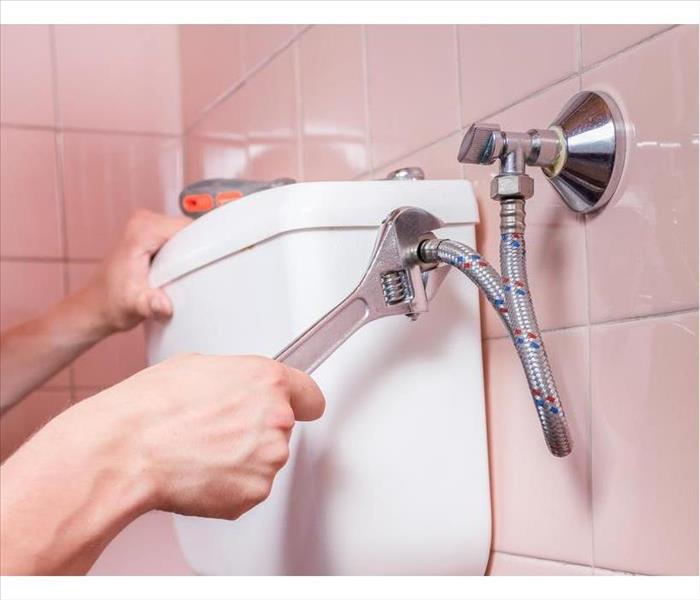 It's important to use the appropriate wrench to disconnect a supply line
It's important to use the appropriate wrench to disconnect a supply line
5 Steps for Replacing a Leaking Toilet
When your home has a leaking toilet in Weaverville,NC, your first reaction may be to check that the water supply line is leaking. If this is not the problem it may be time to replace the gasket. Here are five steps to follow.
1. Turn Off the Water
One of the first steps to replace an old toilet gasket, is to turn off the water before beginning. In many cases the water supply line will be attached to an off valve which is located in the bathroom.
2. Disconnect Supply Line
Once the water is turned off you can drain the toilet by holding the leaver down, and then began to disconnect the water supply line. It's important to use the appropriate wrench for the job in order to prevent any damage to the fittings.
3. Move Toilet Aside
After the water is drained and the supply line disconnected you can begin to move your leaking toilet away from the base. At this point you may wish to check for any water damage as result of the leaking, and contact a local water damage restoration service to conduct any necessary repairs.
4. Replace the Gasket
Once any water damage to the floor has been repaired, you can continue with the toilet repair. At this time remove the old gasket, scraping away any remaining residue, and replace it with a brand new one. Ensure the new gasket is properly set, and then return the toilet to its original position. If you have any questions about this process a professional may be able to help.
5. Reconnect the Water
After the gasket has been replaced, and a toilet reinstalled you can begin to reconnect the water line. Ensure that all the fittings are correctly tightened, and remember to contact a professional if you have any questions.
Following these five steps may allow you to replace the gasket and stop a leaking toilet. Turn the water off before beginning the replacement process, and ensure all the fittings are correctly tightened when you are done. Remember, if you find water damage during this process it's best to contact a local professional for help.
Replacing a Leaky Toilet
10/11/2019 (Permalink)
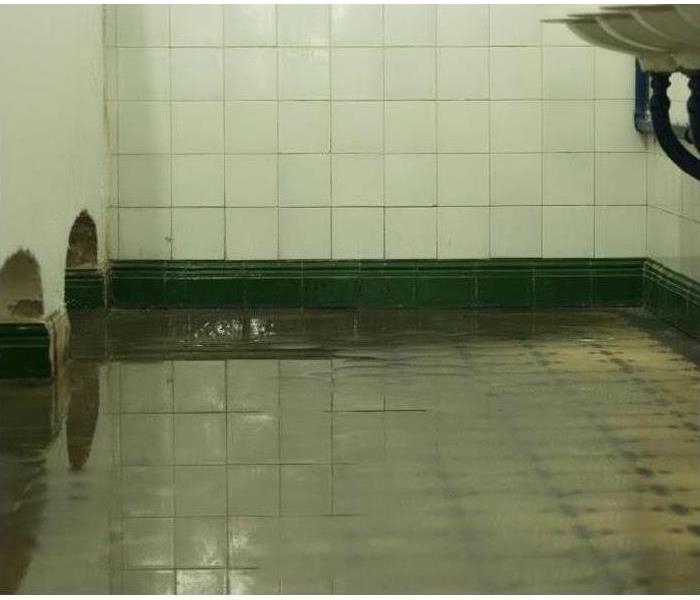 Determine whether toilet repair or replacement is the appropriate response to leakage.
Determine whether toilet repair or replacement is the appropriate response to leakage.
The prospect of replacing a leaking toilet need not strike fear into the heart of a homeowner nor necessarily require calling in a specialist in or near Asheville, NC to get the job done right. With a toilet tutorial, a few simple tools and a confident mindset, you can set things right.
Confirming the Need for Replacement
Determine whether toilet repair or replacement is the appropriate response to leakage. If damage to the bowl or tank is not the issue, check the shutoff valve and supply tube. A sweaty bowl can also give the appearance of a leaking toilet. Gently tighten the closet bolts that join the toilet to the floor and recheck for seepage. Rule out the relatively simple fixes.
Mastering the Steps of Installation
A methodical approach makes swapping out an old toilet for a new model a manageable task. Preview these steps and gather the necessary tools.
1. Completely close the shutoff valve.
2. Take the lid off the tank and flush the toilet, holding it down to empty the tank. Soak up any remaining water.
3. Disconnect the water supply tube.
4. Remove the caps from the closet bolts and remove the nuts.
5. Grip the bowl and move it from side to side to break the wax seal. Remove the toilet. Scrape the closet flange in the floor to remove any residue. Inspect the flange and repair or replace it if there is damage.
6. Replace the wax seal and ensure that it is perfectly centered.
7. Install a flexible supply tube in the appropriate length.
8. Apply pipe-joint compound to both ends of the supply tube fittings and tighten one end to the fill-valve shank.
9. Firmly push the toilet into place, compressing the wax seal.
10. Check placement, and then gradually tighten the closet bolts gently to avoid cracks.
11. Attach the water supply tube to the shutoff valve and then open it.
Monitor the fit not only after a few test flushes, but also for a few days afterward, tightening the nuts as needed. Successful completion of these steps will put to rest the inconvenience of a leaking toilet. Visit http://www.SERVPROashevilleeast.com for more information on water damage.
Making a Water Damage Claim? Read This First.
8/30/2019 (Permalink)
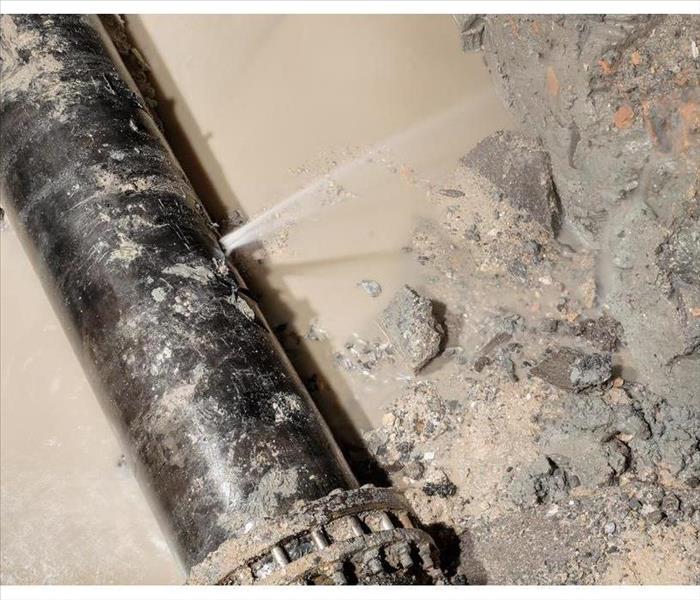 Bursting pipes can easily result in expensive damage.
Bursting pipes can easily result in expensive damage.
Tips on Making A Water Damage Claim
There’s never a good time for water damage to strike in Fairview,NC. You must deal with a wide range of problems: bursting pipes, discolored walls, ruined furniture and more. It’s the second most frequent type of home insurance claim, but there are often complex details impacting whether or not a claim is paid. Before you contact your insurer with a claim, you should review some helpful tips.
1. Understand Your Homeowner’s Policy
Claims for damage resulting from water can be tricky. Whether they’re paid or denied often depends on the nature of the incident and the policy’s provisions. For instance, a policy may not cover the cost to fix a broken pipe but could reimburse you for resulting damage from bursting pipes. Also, your coverage may not include reimbursing you for gradual damage that happens due to problems that have slowly developed over time. Read through your policy carefully and make sure you understand its coverages and exclusions.
2. Keep Up With Regular Maintenance
Seasonal maintenance is one important key to catching and fixing problems before they get worse. Perform a thorough check each fall and spring, focusing on critical areas. Pay attention to areas through which water can leak: window panes, thresholds, door seals, exterior walls, insulation, gutters, drains and even your roof. Your plumbing is especially important since bursting pipes can easily result in expensive damage.
3. Keep Complete Records
Comprehensive documentation is your friend when it comes to home insurance claims. Your files should include records of repairs and maintenance services you’ve paid for over the years. Detailed invoices from the contractors you’ve hired are especially beneficial. If you have records from prior insurance claims, hold onto those as well.
When making a claim, both knowing your coverage and doing your due diligence are critical. Working with a water damage restoration company is also vital to getting your home and life back on track. For best results, choose a responsive and trustworthy professional that’s Faster to any size disaster.
What to Do After Water Damage to the Kitchen
6/12/2019 (Permalink)
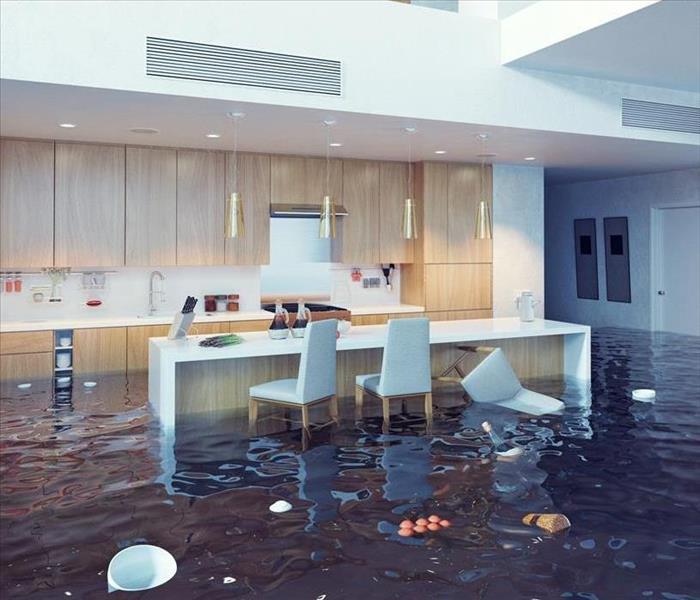 Flooded kitchen in Biltmore, NC
Flooded kitchen in Biltmore, NC
Four Steps to Take To Repair Flood in a Kitchen
Dealing with flooding at a residence can be very stressful and may create extraordinary damage. If a flood occurs in the kitchen, water in and around kitchen appliances may create a costly and difficult cleanup. If water damage has occurred at a residence in Biltmore,NC, here are four steps to take to repair the problem quickly.
1. Turn the Water Off to the Residence
If water damage has occurred, shutting the water off to the home may be a great first step to take to fix the issue. Turning the water off may help to prevent further damage from a broken pipe, for example. This may also be advantageous if the source of the flooding is not immediately clear.
2. Shut Off the Electricity
Water and electricity do not mix well! Therefore, it may be a great idea to turn off the electricity to the residence after a flood. If damage has occurred to appliances in the kitchen, for example, consider unplugging them after the electricity has been turned off before attempting any sort of kitchen repair. Professionals who provide repair services for water damage are experienced and qualified to safely handle this sort of situation. (Always use extreme caution if there is water in home appliances or kitchen appliances to avoid being electrocuted.)
3. Retrieve Important Documents
Only if it is safe to do so, retrieving any important documents and paperwork from a home that has been flooded may be a good idea in case further damage occurs. Additionally, photographs and other sentimental items can be heavily damaged by water. Safely retrieving these items may provide great comfort for some individuals.
4. Request Help From Experts
Experts who handle water damage may be lifesavers for an individual who has experienced flooding in a residence. Therefore, it can be wise to call for assistance. Additionally, it may be a good idea to take photographs if a homeowner files a claim with an insurance company.
Safety for homeowners and residents after flooding in a home is crucial. Following these suggestions may help to keep individuals safe and have things repaired as soon as possible - “Like it never even happened.”
Helpful Tips to Avoid Water Damage During Building Construction
4/16/2019 (Permalink)
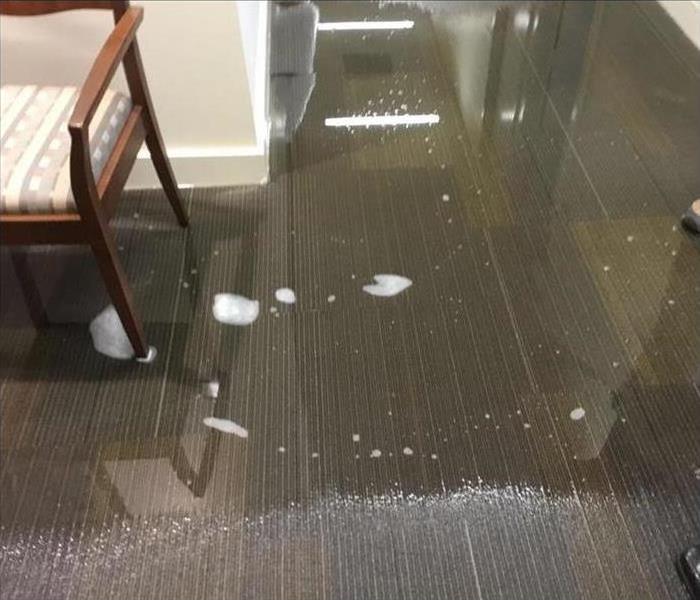 There was a pipe burst in this facility causing flooding
There was a pipe burst in this facility causing flooding
If you’re building a new work facility, or if you’ve hired crews for a major remodeling project, it’s an exciting yet stressful time for you and your organization. There are a lot of moving pieces in this endeavor, and you want to make sure everything comes together smoothly. It’s not unheard of for flooding to occur during construction projects. To help avoid the need for water pipe repair and other major issues, it’s critical to understand some simple flood prevention guidelines.
Most Common Issues
You may hear about Montreat, NC, companies that experience water damage during rebuilding or construction efforts. Thee problems often occur due to some of the following:
- A broken pipe or series of pipes
- Main supply line defects, leaks or brakes
- Sewer backups
Sometimes, you can chalk up these incidents to lack of awareness on the part of the construction crews. However, other times, it’s difficult to identify the causes.
Work Closely With the Construction Company
You trust the construction team to do its job well and complete your building according to the specs and time frame you agreed on. Still, you should be in frequent contact with the contractors and crew leaders to ensure they’re following best practices and safety regulations. This includes making sure everyone is aware of potential issues that would result in water pipe repair and other water damage incidents.
Proper Testing
You can never be too careful on a project of this magnitude. Too many organizations experience flooded offices due to skipping steps or rushing through the project. Make sure the construction crew does water tightness testing and monitors piping closely.
Have Water Cleanup Teams Handy
In the event of flooding or water damage concerns, you’ll want to get a commercial water mitigation company to the construction site in a hurry. These professionals can put a halt to a small problem before it gets too big.
Water pipe repair could save your office from a major flood. Follow these guidelines to ensure your office is sound and sound from water issues during construction.
Must Water-Damaged Carpet Be Replaced?
3/14/2019 (Permalink)
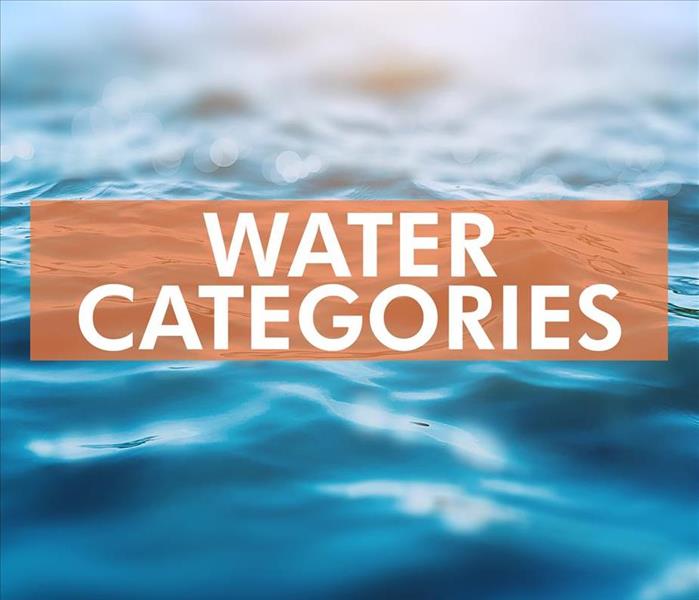 When it comes to water damage, all h20 is not the same
When it comes to water damage, all h20 is not the same
Whether it comes from a flood, a pipe break or some other catastrophe, a major water episode can spell big bills. One of the costliest items to replace can be carpeting. You may even wonder if it needs to be replaced at all. That all depends on the type of water damage. Learn more about what types of water damage to the carpet in your Asheville, NC home can be safely cleaned, and which types require replacement.
Different Water Types
When it comes to water damage, all h20 is not the same. That’s because water can come into contact with many substances that can make it contaminated and any materials it comes into unsalvageable. The three main types of water causing property damage are:
- Clean water
- Gray water
- Black water
While clean water from a pipe break may simply cause cosmetic damage, gray and black water can create dangerous environments.
When You Can Keep Water Damaged Carpet
Pretty much the only time you can keep water logged carpet is if it was damaged by clean water. Clean water is water from broken water line, a leaking faucet or some other relatively clean source. Items touched by it can simply be cleaned.
When You Must Replace Carpet
Gray water is what you’d expect from a minor toilet overflow, a dishwasher leak or a washing machine malfunction. Black water, on the other hand, includes things like sewage, which can contain viruses and bacteria. Items contaminated by gray or black water should not be salvaged. If that includes your carpet, plan on getting a replacement.
Water damage cleanup should always be handled with care. Plan on replacing carpet tainted by gray or black water. If clean water from a pipe break has done all the damage, talk to a water damage restoration specialist to see how you can make your carpet like new.
Tips for Avoiding Secondary Damages After Flooding
1/18/2019 (Permalink)
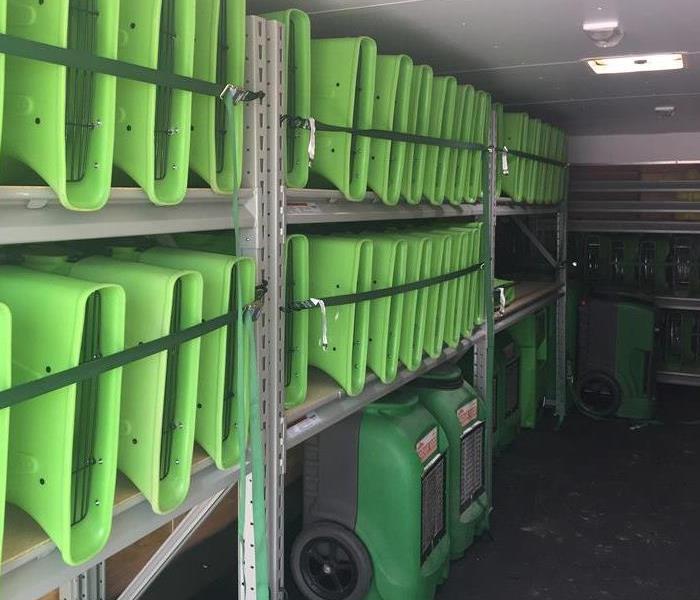 SERVPRO of Asheville East dehumidifiers
SERVPRO of Asheville East dehumidifiers
Responding to Flooding Immediately
When your home is affected by flooding from a winter storm or a broken pipe, secondary damage is a very real concern. As high humidity spreads throughout the residence, the chances of black mold taking hold and porous materials in your home absorbing moisture increase. Responding to flooding immediately is crucial to preventing further damage.
Commercial-Grade Equipment
Whether you involve a Asheville,NC , flood damage cleanup company or try to tackle the situation on your own, you will need to use commercial-grade drying equipment. There are several reasons for this.
- Your home's air conditioner isn't strong enough to handle the additional moisture.
- The longer it takes to thoroughly dry your home, the more at risk you are of facing black mold damages.
- You'll get back to your normal routines more quickly.
Secondary Damages
Additional damages after flooding include the growth of mold behind drywall, in the attic, below carpeting, and in hidden corners. High levels of moistures can lead to weakening in the materials used to build your home, including wood, insulation, and cabinetry. In addition to long-term negative effects, your costs and losses could be increased when water extends from the initial affected area. As water spreads under doors and through walls, it reaches areas of the home that could have been protected. Removing water and drying the area thoroughly is the best way to avoid the spread of damages.
Water Removal Technicians
High volume dehumidifiers, specialized heaters, and powerful fans are necessary tools for quickly and thoroughly drying rooms affected by flooding. Professional flood damage restoration technicians have the training and experience to set the equipment up for quick results. Experienced workers are often willing to share tips for avoiding problems such as recurring leaks or flooding.
Takeaway Tips
Remember, you need to act immediately. Powerful commercial-grade tools are essential for preventing secondary damages, such as black mold. Hiring Asheville,NC , professionals is a great way to enjoy long-term protection for the well-being of your home and the health of your family.
How To Evaluate a Leaking Bathtub or Shower
10/12/2018 (Permalink)
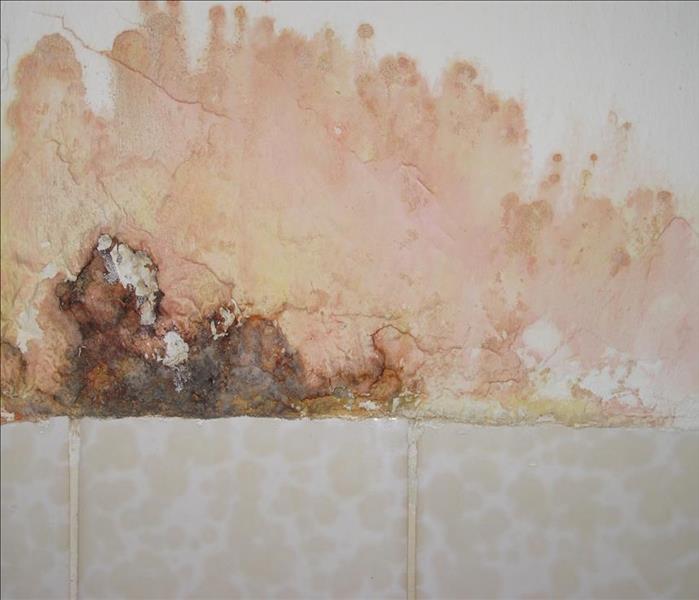 Damp spots on your bathroom walls can mean a leaking bathtub or shower problem
Damp spots on your bathroom walls can mean a leaking bathtub or shower problem
Your bathtub and shower are exposed daily to water. Regardless of your home’s age, plumbing components and fixtures can break or deteriorate, which may allow water to flow into unintended places. No home in Asheville,NC, is immune from a potential shower or bathtub leak, so it’s important for every homeowner to recognize the signs of water leaks and act promptly to minimize damage.
Locating a Water Leak
Water can leak for a significant period before it becomes noticeable. Common indications of a leaking bathtub or shower include the following:
- Damp spots on walls
- Water dripping from overhead
- Stained ceilings
- Puddles around tub or shower
- Presence of a musty odor
Investigating Bathtub Issues
To diagnose the source of a bathtub leak, you may need to remove the tub’s side panel or access the crawl space under your home to check for cracked pipes, leaking joints or a broken waste trap. If you find a leak, replace any damaged components and tighten loose washers. To confirm the problem is resolved, plug the tub, fill it with water and then let the water drain.
Diagnosing Shower Pan Leaks
Pre-fabricated shower pans may crack and leak, especially if they move due to improper installation or a warped subfloor. A shifting pan can also damage seals, rendering them ineffective.
To confirm a shower pan leak, take the following steps:
- Plug the shower drain with a stopper or duct tape
- Fill the pan with water
- Mark the water level
- Allow the water to sit for at least eight hours
If the shower is not properly plugged, some water may escape. To confirm a leak, you should check the subfloor below the shower for signs of water damage. A moving shower pan can cause significant problems, so it’s important to promptly correct the problem.
Taking Immediate Action
If you suspect a water leak, find the water source and complete the necessary repairs. Ignoring a shower or bathtub leak is never a good idea because it can result in significant water damage that may require extensive cleanup and restoration efforts.
Category Three Water: What Is It and Who Should Clean It?
9/17/2018 (Permalink)
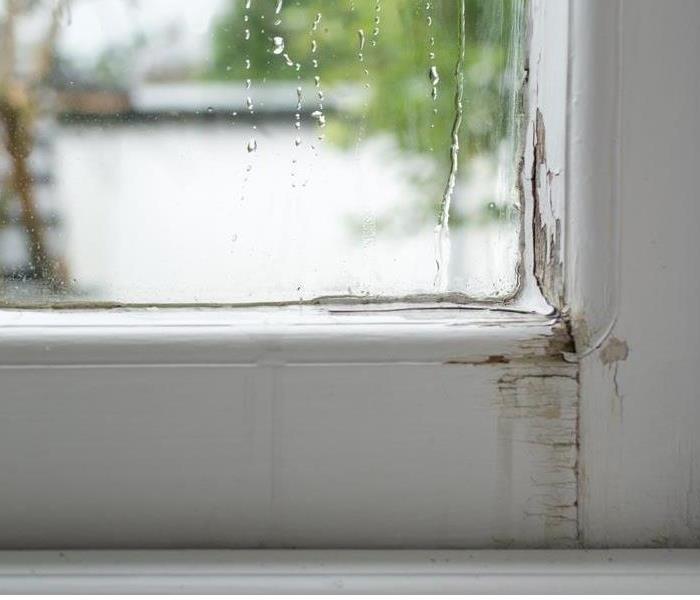 Water Damage can be risky in your Asheville home or business
Water Damage can be risky in your Asheville home or business
Asheville, NC, is prone to flooding during the rainy season. As business owners, this presents a growing concern for not only safety and profitability but the integrity of your property. Thankfully, most insurance companies cover burst pipes and toilet overflow; however, if your business is ever struck by flood water, you may be left with a few questions about water categories, especially category three.
1. What Is Category Three Water Damage?
Category three water damage is typical in large-scale flooding. This natural disaster tends to overflow rivers and overburden sewage systems leading to a dangerous mixture call the black water. At this category level, water is capable of supporting bacterial growth and becomes hazardous for humans and pets to consume or come into contact.
2. Can You Clean Category Three Water Damage Yourself?
No, unless you are a professional, you should not attempt to clean black water yourself. This type of flood water can cause illness and disease and possibly death if touched or ingested. It is not uncommon for this type of water to carry hepatitis pathogens, and you do not need to swallow this water to become ill or a carrier.
3. Who Cleans This Type of Water Damage?
As category three water is dangerous, it is wise to seek the assistance of professionals who hold the appropriate certifications and training to handle and dispose of this type of water. You can check with your local municipalities or emergency managers to find restoration specialists capable of this type of work.
Since flooding is a concern for most business owners in this area, and category three flood water presents potential risk from exposure, it is wise to seek assistance from your insurance provider and local government to ensure that you as well as your business remain safe. Do not let the concern over expense come above the concern for your health.
Water Damage Restoration in Asheville East
6/24/2018 (Permalink)
Homes experience considerable damage after being exposed to water. Whether it is from putting out a house fire or from a flood, water can wreak havoc on a home instantly. Homeowners should never attempt to restore a home themselves. In fact, homeowners shouldn't even enter their home after it has been exposed to water damage. Homes often lose structural integrity, putting anyone who enters it at risk. If you've experienced water damage of any kind, it is important to contact professionals. A professional restoration team will be able to bring the home back to its former glory by cleaning and repairing it. They'll handle every aspect of the restoration process, ensuring that the job is done efficiently. To better understand why it is imperative to get help from professionals, homeowners should understand the hazards that come from water damage Asheville East.
Mold and Mildew
While most don't realize it, one biggest dangers posed to homeowners after experiencing Asheville East water damage is mold and mildew. These growths are a form of secondary damage that can be more dangerous than the actual flood or fire. Because homes are closed off from fresh air, the presence of water increases humidity levels. After a flood or fire, homes will become incredibly damp and humid, creating the perfect breeding ground for mold. The warm and moist environment can even cause spores and fungi to grow.
The danger with mold and mildew lies with the health effects they cause. Those with even moderate allergies can experience flu-like symptoms shortly after exposure. Inhaling these pathogens can even cause life-threatening ailments. Homeowners risk getting cancer, immune diseases, and a number of other conditions. There are numerous types of mold and mildew that can grow, all of which are dangerous to humans. To avoid the risk of exposure, homeowners shouldn't enter their home until it is fully restored.
Professionals use a variety of methods to stop the growth process and eliminate any existing pathogens. They have the knowledge and expertise required to deal with these harmful growths. They'll be able to clear the home of mold and mildew before homeowners have a chance to enter.
The Restoration Process
A professional restoration team can begin the process as soon as possible, often times beginning immediately after a fire or flood. This helps to ensure that any the risk of further damage is reduced. They will begin by removing excess water from the home. They'll use a number of drying techniques to rid the home of moisture as soon as possible. This helps to stunt the growth of mildew. They'll often use heavy equipment to get the job done, such as driers and dehumidifiers. Dehumidifiers will remove moisture and heat from the air to further lessen the chances of mold growth. If mold is already present, they can remove it effectively and sanitize the area, making it safe.
In addition to mold and moisture removal, restoration companies work to repair any structural damage that may have occurred. Homes can experience significant structural damage when exposed to water, making the home unlivable. Restoration teams work to secure the home's structural integrity by removing and replacing certain components. To ensure that the home is completely safe for occupancy, they'll often examine the entire home for damage that may be undetectable. In the end, their work will make it safe for homeowners to enter.
Asheville East Water damage restorations help homeowners regain their space. It's important for homeowners to get help from professionals immediately after a fire so that their home doesn't experience further damage. In most cases, homeowners can get their insurance company to cover the costs. Depending on the scope of the damage, a restoration company can restore a home quickly and efficiently, allowing homeowners to return in no time without having to risk their personal safety and health. For more information about how water damage restoration can help, homeowners should contact a professional restoration company.
Water Damage Restoration
Basement flooding or storm damage doesn't wait for regular business hours and neither do we. We respond to your residential or commercial water removal and cleanup needs. Our fast response time and advanced drying methods help prevent secondary damage and mold. Common causes of water damage are:
What Causes a Home To Have Noisy Pipes?
3/25/2018 (Permalink)
You may be used to all the sounds your Asheville, NC home makes each day. You probably know which steps creak and what it sounds like when the house settles in the winter. However, when your home's water pipes start making new or unusual noises, this may indicate that one is about to suffer a pipe break. Since this can cause considerable flood damage, knowing why your pipes are making noise may help you prevent this issue.
Pipe Sediment
Over time, sediment can build up in your home's water pipes that might narrow the path the water flows through. This can be especially common in areas that have a high percentage of lime or calcium in their water. As the pipes narrow, this can cause a whistling sound whenever the water spigots are turned on. Replacing these affected sections may prevent you from having to fix a broken pipe later, when the water can no longer flow through it.
Loose Pipe Straps
If your home's pipes bang or clang when a sink or appliance is turned off, this may mean that the metal pipe straps that secure them to the wall are loose or failing. Since rattling can cause a pipe burst, this is a problem that should be remedied right away. Check interior and exterior pipes, inspect the straps, and replace any that are worn or broken to prevent an eventual pipe break.
Water Heater Needs Servicing
You may sometimes hear a rumbling or crackling sound coming up through your home's pipes. However, this sound is probably emanating from a water heater that has sediment buildup. Over time, sediment can form in the tank and trap some of the water, which boils and causes the strange sounds. You can call in a qualified restoration company to flush out and clean the tank so that it runs quieter and with increased efficiency.
Your Asheville, NC home's water pipes probably make a variety of sounds you may be used to. However, some of these sounds could indicate an inevitable pipe break, and having them checked out may prevent a costly and damaging flood. Visit http://www.SERVPROashevilleeast.com for more information on water damage.
Don’t Panic Over Burst Pipes
1/19/2018 (Permalink)
As winter comes in full force, burst pipes will become a reality for some homeowners. To wake up in the morning to a flood of water is a nightmare, to say the least. No matter how big or small the flood is, keep in mind that a little water can do a lot of damage in a short amount of time. If you’re unlucky enough to be hit with water damage from a broken pipe, don’t fret, these three tips will help you through it.
1. Calmly Assess Damages
As with any emergency situation, the key is to stay calm. Stress can make it difficult to make informed decisions or recognize the reality of the damages caused by the flood. First, look for the most visible signs of water damage on walls, rugs and furniture. If anything is saturated, bring in a restoration specialist to ease your mind and start damage control.
2. Utilize Fresh Air
To dry out your home and protect against further water damage, you should air out your residence entirely. Open the windows and run a fan to get the air flowing through your residence. Additionally, you may use a dehumidifier to push the process forward.
3. Clean Mold and Mildew
After the water cleanup, mold and mildew have to be eradicated. Detergents and bleach may be appropriate for the cleanup. You can scrub nonporous furniture and objects free of mold. However, for nonporous contents, they may need to be tossed out.
Water damage due to broken pipes is common. When it happens, however, you don’t have to go into a panic over what to do next. It’s important to stay calm to be able to appropriately assess all the damage done to your Asheville, NC home. Once the damage has been fully gauged, you can begin the process to dry everything and address mold and mildew.
Visit SERVPRO of Asheville East at http://www.SERVPROashevilleeast.com/ for more information about water restoration.
What to Consider When Looking for Water Damage Restoration Services
10/3/2017 (Permalink)
What to Consider When Looking for Water Damage Restoration Services
Water in home or water in business is nowadays a common occurrence. The majority of these situations are caused by things that can be prevented while a number of them are natural calamity such as storms. Regardless of the cause of a flooded home, it is imperative for the owner to take immediate steps towards restoration. Flood damage is critical because it could cause more loss of property and derail business operations.
If you have a flooded home, the most important thing is to take immediate actions to ensure that this situation is brought under control immediately. However, many homeowners do not know what they could do instead they panic and take actions that deteriorate the situation or cause more damages.
What are the causes a flooded home or business?
There are different causes of water in home or water in business. Some of the most common causes include toilet overflows, supply line break, water pipe break, faulty plumbing system and other natural incidences such as storms. Whatever leads to an influx of water in your home or business premises, the most important thing is to ensure that a water cleanup is done to prevent water damage.
Excessive water can cause damages to your wooden floor, destroy your belongings and furniture among many other. This costly damage caused by supply line break or pipe break could create a hazardous environment. You need to treat the situation as an emergency because further delay would lead to advanced flood damage.
When faced with this kind of situation in your home or business, it is imperative that you contact a local damage restoration company. Water in home or water in business can be restored by professionals. A flooded home would undergo clean up and subsequent restoration or mitigation.
It is essential that homeowners have emergency contacts to be able to call a professional water damage restoration company in the event of a flooded home. You never know when water in home situation could occur; hence, you ought to be ready. The supply line break or the pipe break is some of the things that have to be restored immediately.
The advantages of using a professional restoration company
Immediate response: The water in home or water in business is a situation that requires an immediate response because of the danger it poses to the property. Hiring professionals, you can be assured that they would come to your aid immediately. They would first repair the pipe break or supply line break. The main aim is to minimize the loss hence they could also provide you with some guidance on what to do before their arrival.
Effective inspection: The first thing before the process for water damage restoration and mitigation begins is to create a plan. It indicates that professionals have defined steps that would make sure that the situation is brought under control. The assessment process involves the determination of the most effective approach to the situation. They also do documentation of the damages, which you can also use to file for insurance claims.
Expert water cleanup and drying process: A good restoration company would have all the necessary equipment to begin the extraction process. They use modern techniques to remove all the water damage, moisture and debris. The wet belongings are taken to a safe custody for drying.
The experts are knowledgeable on the best water cleanup methods using the modern equipment that include moisture detection cameras among other which enable effective and efficient restoration. After the removal of moisture, the drying process begins immediately after disinfection and sanitization. The drying process is achieved through tools such as the dehumidifier. The importance of ensuring sufficient drying is to prevent fungal growth.
Professionals are equipped with skills, tools, and knowledge: The flood damage mitigation and restoration is done using state of the art equipment. This process usually begins within 48 hours. The mitigation process ensures thorough water cleanup, repair of pipe break or supply line break among other. Flood damage can have cost implication in home or business if not taken care quickly.
Visit http://www.SERVPROashevilleeast.com for more information on water damage.
Tips To Prevent Water Damage Before Professionals Arrive
8/23/2017 (Permalink)
Tips To Prevent Water Damage Before Professionals Arrive
In every instance of water damage, restoration professionals should be called to the scene to inspect the damage, perform mitigation, and undertake restoration. Whether the source is from a pipe break, supply line break, or flooded home, restoration professionals are the people with the knowledge and equipment to minimize damage. What do you do before restoration experts arrive, though? If you have water in your home or water in your business, there is going to be a period of time that elapses before mitigation by professionals can begin. During this time, you can do a few things to help prepare a home or business for a restoration company to take over.
Things you can do before the restoration company arrives
If you have a flooded home, chances are you're not just going to want to sit around with water on all of your things. There are a few things you can do while waiting for the restoration company to get on the scene that will help minimize water damage and prep the area for the restoration company. In fact, the water cleanup can begin with those few moments you spend waiting for the professionals. Here are just a few things to do after you've experienced flood damage:
- Mop or blot the surrounding area in your home or business
- Turning on air conditioning is going to help begin drying
- Delicate items that haven't succumbed to water in the home or water in the business can be removed to a safe place
- Picking up anything from the floor that hasn't gotten wet yet can help
These few little things can help some of your items escape water damage. While it doesn't seem like much, this small water cleanup can really help professionals minimize flood damage in a flooded home.
Turning it over to mitigation professionals
If you've done these few things when there's water in your home or water in your business, then you've done the most you could to protect your items from water damage. You've moved some items out of harm's way and began the drying process, however ineffective it might be if you left it at that and called no one. Water cleanup started with these few things.
Now professionals will enter your flooded home and assess the cause of the damage. They will check to see if it was natural flooding, a supply line break, a pipe break, or a leaking appliance. While the air conditioner did a bit of driving, professional mitigation experts will have industrial dryers and water movers that will finish the water cleanup efficiently. Drying with these large industrial dryers is often the only way to ensure a complete and thorough mitigation process. Without professional drying, the flood damage will permanently ruin many of your precious items in your home or business.
Don't make the mistake that so many people make and do absolutely nothing during a crisis such as this. If there is water in a home or water in a business, you aren't completely helpless to do anything. Flood damage can be minimized by prepping the area for a professional to arrive. In the case of a supply line break or a pipe break, you might want to wait for professionals. After all, a supply line break or a pipe break isn't going to be immediately visible. This means a professional will have to assess the reason for the water flooding into the home. In those cases, you're fine to wait for professionals to arrive.
In other cases where you stand by and helplessly watch water flooding onto your personal belongings, you CAN do at least something while you wait for professionals to arrive. By doing those few little prepping actions, you're going to make it much easier for professionals to do a more thorough and faster cleanup later on, saving many of your valuable things.
Visit http://www.SERVPROashevilleeast.com for more information on water damage.
Remediating A Potential Water Damage Situation
7/25/2017 (Permalink)
Remediating A Potential Water Damage Situation
Water damage is one of the most insidious forms of damage that a property can endure. All too often, water damage is not immediately recognized as the serious threat to the property that it is. Left untreated, even small amounts of water damage can quickly lead to rot, mold formation and even structural compromise. In severe cases, water damage can lead to the property becoming uninhabitable, leading to condemnation and total loss of the property's value.
Luckily, there are effective ways to deal with flood damage. The important thing to know is that even if a supply line break or pipe break seems small and containable, it is absolutely imperative that a professional restoration company be called in to perform a restoration. If started soon enough, flood damage restoration and mitigation are almost always successful. However, even a delay of 24 hours can cause the chances of permanent damage to the flooded home to begin skyrocketing.
In this article, we'll look at a rough outline of the process of restoration of flood damage and mitigation of its effects. We'll see that, should a professional restoration company be called in a timely manner, almost all cases of flood damage will result in a successful restoration of the home or business to its prior state.
A professional restoration company is the only entity that can effectively handle a flooding event. It is crucial that the first thing a property owner does, upon discovering flood water in a home or water in a business, is to get a team of water cleanup professionals on site, as soon as possible.
Once the emergency call has been made, detailing the flooding event, the water cleanup team will arrive. This will usually take place within minutes. Once on-site, the water cleanup team will immediately enter the premises and begin mitigation efforts. One of the first things they do is locate the site of the orginal supply line break or pipe break, cutting of any active leaks. If the supply line break or pipe break proves difficult to close off, by conventional means, the team may use welding equipment to effect an emergency cutoff of the water flow.
The team will then inspect the property, noting the severity and extent of the water in the home or water in the business. They will formulate a damage mitigation plan.
Next, the team will begin pumping out all of the water in the home or water in the business, using heavy-duty pumping equipment and specialized vacuums. They will be able to pump out up to 2,000 gallons of the water in the home or water in the business. The complete extraction of all water will be completed within one hour.
At this point, the flooded home or business will have no standing water and may appear to be more or less dry. But there will still be water soaked into the property's materials.
The team will next begin the drying process. Using large, industrial-strength drying equipment and powerful dehumidifiers, the drying equipment will be able to remove thousands of pounds of moisture from the property's atmosphere and materials each hour. The drying process is generally the longest step in the restoration of the flooded home or business. It may take between a few hours and a whole day.
Now the property will appear like new. But it still needs to be cleansed and sanitized. The area around the original pipe break or supply line break will be thoroughly cleansed and sanitized, in order to prevent mold and mildew growth. All of the homes items will be cleaned, preventing the formation of unpleasant odors.
Visit http://www.SERVPROashevilleeast.com for more information on water damage.
What to Expect From Water Mitigation
6/29/2017 (Permalink)
What to Expect From Water Mitigation
The sight of standing water in home or business properties can cause you to feel stressed and panicked. Water in business and residential properties requires professional restoration and mitigation service if you want the issue dealt with promptly and in a way that protects property value. However, your flood damage or other type of water damage likely developed out of the blue, and you may have not had the water cleanup and drying out process in your plans this week. With a greater understanding about what you can expect from the restoration and water cleanup process, you can better prepare yourself for the days ahead.
The Initial Response
Regardless of whether you have flood damage from a major storm or another type of water damage in your property, you should immediately contact a water cleanup crew to assist you. The water mitigation team that you choose to use for this service should have 24-hour availability and should be able to respond quickly. Remember that you may be able to stop some of the water in business or residential properties from increasing while you wait for help to arrive. With flood damage, it is not usually possible for the property owner to prevent more water from entering the space. However, if your water damage is caused by a plumbing leak, you can turn off the property’s main water supply valve. This is just one example of how property owners can respond to the issue of water in business or residential properties in a positive manner.
Drying Out the Water in Home or Business Properties Quickly
As soon as your water restoration and mitigation team arrives, they will immediately take steps to begin drying out the property. Drying the water must be completed promptly if you want to reduce the chance of mold growing in the space. Therefore, your water cleanup crew will usually use extraction equipment designed specifically for this purpose to remove the water from the property. Water in home or business properties is not the only damaging force that you may contend with. Moisture in the air can also cause mold to grow, and it may create a musty odor in your space. Therefore, the drying out process should also include the use of a dehumidifier. The remaining steps in the flood damage or water damage cleanup process can begin as soon as all moisture has been removed from the surfaces and the air in the property.
The Remainder of the Restoration Process
After the water in home or business properties has been removed, you may notice signs of damage throughout the affected area. This may include water stains on tile, drywall or carpeting. Wood surfaces may be warped, and drywall may be deteriorating. These are only a few of the primary types of damage that you may notice after the water cleanup step has been completed, and the restoration team will remove the damaged areas as needed. These surfaces will be replaced with quality materials. In some cases, such as when dealing with stains and musty odors, the surfaces may be professionally cleaned. After the mitigation team has completed the work in your home or business property, your property will be fully restored. All signs of the water issue will be removed.
If you have water in home, you may not be able to live comfortably in the space until the repair work has been completed. When you have water in business properties, you may not be able to conduct your money-making operations. You understandably need the water cleanup and mitigation process completed as soon as possible. There is no time to waste when dealing with any type of water damage, and this is because the risk of mold growth is great. Now is the time to set up restoration work for your property if you are dealing with flood or water damage today. Visit http://www.SERVPROashevilleeast.com for more information on water damage.
Brief Overview of the Water Damage Restoration Process
5/19/2017 (Permalink)
Brief Overview of the Water Damage Restoration Process
Water remains one of the most dangerous substances inside an indoor environment due to its destructive nature. Excess water in home or water in business causes property and structures to deteriorate rapidly. Water damage in the home or commercial property could be as a result of burst pipes, excess rain leading to floods or accidental spills inside the property.
Immediately after water spills or enters a property as a result of floods or burst pipes, the water cleanup process ought to commence immediately. This process should start after the rising water levels are noted as a mitigation measure from the losses caused by flood damage. Here are some important water damage restoration tips that can help in case of floods or accidental spills.
First Steps
Immediately after water floods inside an office or home, the first thing that ought to be done is the removal of excess water from the property through mopping and blotting. Water on the wood furniture should be wiped dry after removing all tabletop items and lamps. The wet cushions and upholstery should be removed and propped to dry. Colored rugs ought to be kept away from the wet carpets. All art objects and wood panelling ought to be removed from the walls and kept in a safe and dry place to allow the wall adequate time to dry. Aluminum foils or wooden blocks should be placed between the wet carpeting and furniture legs as a mitigation measure from the continued exposure to water or moisture. The air conditioning ought to be left on to hasten the drying process as well as ensure that the house is well ventilated.
Loss Assessment
Evaluating the loss associated with flooding inside a property is usually the first and most important stride in the process of water damage restoration. It should be done accurately in order to come up with the appropriate plan of restoring the property back to its prime condition. The process of assessing the loss incurred and categorizing it involves the input of both the insurance company and the flood damage control experts. The team identifies the source of the damage, document it and come up with accurate estimates necessary for restoring the property.
Afterwards the categorization process follows and it is determined by the water contamination levels. Category 1 encompasses water coming from sources such as sinks, pipes or toilets as long as it is not mixed with waste. Category 2 includes water bearing contaminants from a washing machine, dishwasher or toilet. Category 3 encompasses contaminated water that can cause death or illnesses from sewages, toilets, flood waters or stagnant water with microbial growth.
Decontamination and Drying
After the assessment and categorization process is complete, the next phase involves drying and decontaminating the property. Decontamination and drying forms an important stage in the water damage restoration process. The professionals involved in this stage use a number of equipment like dehumidifiers, blowers, subfloor freshening equipment and scrubbers to ensure that the water in home or water in business is completely dried out. The decontamination process is carried out in areas that contamination is detected or on the entire property.
Observation and Completion
Observation of the water cleanup exercise and mitigation of the flood damage is a critical step towards achieving the desired results. The monitoring process involves checking whether the drying equipment is properly set and ensuring that the personnel involved in the water cleanup exercise are well qualified. Adequate mitigation steps ought to be taken when any issue crops up during the monitoring process to ensure the complete eradication of water in business or water in home. The whole water damage restoration process is considered complete when the temperature, humidity and moisture content return to the requisite standards.
Conclusion
All the above stages are important in the water cleanup exercise meant to mitigate the losses brought about by flood damage. This process calls for prompt mitigation measures to be taken immediately floods occur. This is the only sure way of eradicating the excess water in home or water in business. Visit http://www.SERVPROashevilleeast.com for more information on water damage.
Find Your Best Company For A Water Cleanup
4/24/2017 (Permalink)
Find Your Best Company For A Water Cleanup
Because of life's unfortunate events, many individuals have experienced the ravages of water damage. It is a little known fact that any area in the world can become flooded. When flood damage occurs, it can completely destroy materials that are found in those buildings. After flood damage, it is wise to begin mitigation. Most of us are not qualified to handle the problems that come with water in home or water in business. There are many steps to consider when a building has flood damage. In order to perform a water cleanup, things such as drying and water damage restoration are required.
After a home or business has experienced water damage, it is very important to begin the water damage restoration process. Mitigation is the best process to begin when it comes to water cleanup, drying water in home or water in business, air movement, and water damage restoration. As soon as a home or business has experienced flood damage, they must immediately get in contact with a company that can do a deep water cleanup.
What To Expect From A Water Damage Restoration Company
After an individual or family has gone through water in home or water in business, it is imperative for them to get in contact with a professional to begin mitigation. Even if water damage is minimal, there are a lot of other small destructive issues that may occur if air movement and drying do not commence in a timely fashion. A buildup of water can cause mold to grow in places where a family may not even think about, so the entire affected area needs to get a good amount of air movement with the help of professional equipment. That mold could cause serious health risks to individuals in a family or business. A professional company that is accustomed to dealing with water in the home and water in business can do a thorough clean up.
The first thing that needs to happen is for a company to come out and do a site inspection. Since all water damage is different, the company has to evaluate the best way to carry out the mitigation. After a company has figured out the steps that they have to take to remove water from home, they will take care of the job from beginning to end. These professional companies know exactly what they need to do in order to start the drying process, create air movement in the home, and finish the water damage restoration.
Many savvy individuals have made the choice to get flood insurance, and if that is the case, a trusted company that deals with water in home and water in business will take the needed steps to get in contact with the insurance adjuster. This is a company that is dedicated to completely restoring the home, and they do all that they can to work quickly in order for their clients to be able to get back to their everyday life.
There is really only so much that an individual can do to avoid natural disasters, but it is good to know that there are simple steps that can be taken in order to get water cleanup done in a way that is safe, efficient, and speedy. Visit http://www.SERVPROashevillewest.com for more information on water damage and cleanup.
Water Damage Restoration For The Home
4/24/2017 (Permalink)
Water Damage Restoration For The Home
Water restoration is quite important for the house as it must be done by a water cleanup crew that is expert in the field. They must be prepared to help the homeowner when there has been flood damage or water damage in the house, and they must be called as soon as possible for any water in home or water in business problem. This article explains how water damage restoration and the mitigation process will be completed. There are many people who have no idea how to complete drying or air movement in the house, and it is will be quite apparent that the home may return to its former glory.
#1: How Much Water Is There?
Water damage and flood damage may be quite bad as it will fill up the house with water that is so difficult to remove. The water cleanup crew will begin their work by ensuring that they have planned for the water damage restoration process, and they must ask for an air movement plan that will get all the water out. There are several different people who need drying to begin in the house before anything else may be done, and they will notice the smell in the house changing.
#2: Water In Home Issues
Water in home is something that must be corrected quickly, and it must be removed before the house is made ready for living again. The family cannot be allowed to sit in a house that is filled with water and musty smell, and they may ask the mitigation team how long it will be before they may get back in the house. There is a general plan that will be used for all water in home problems, and the family may prepare to return when the time is right.
#3: Water In Business
Water in business problems are no different, and they are managed in a similar manner. The water in business problems are managed by a mitigation company that arrives with all the proper water damage restoration tools, and they will vacuum the house before they begin rebuilding anything that was torn down.
#4: Different Types Of Water Damage
Flood damage and water damage in the house may be repaired by a water cleanup crew, and the family will learn about drying as it goes on. Each new technique for drying or air movement will take care of a different part of the house, and the family will avoid all the terrible things that traditionally happen when they have a flooded house.
Flood damage may be repaired with water damage restoration, and there is a way to help make the house feel much better to live in. The damp feeling of the house will go away, and the water cleanup company will do all mitigation and air movement until they believe the house cannot be repaired anymore. Call the company in an emergency, and they will arrive with all the people they need to complete the job. Visit http://www.SERVPROashevilleeast.com for more information on water damage.
Water and Flood Damage Restoration
4/6/2017 (Permalink)
Water and Flood Damage Restoration
Repairing the home after water damage and flood damage is quite important because someone who wishes to keep their home in the finest condition. Water in home and water in business concerns may be managed quite easily, and the homeowner in Asheville NC, Fairview NC, Weaverville NC and other parts of North Carolina, and there are quite a few different things that may be done to remove water from the house. Water mitigation, drying and air movement protocols may be used to ensure the house is clean, and this article explains how the problems may be solved quickly.
#1: Cleaning Out The Water
Water in home or water in business issues must begin by vacuuming all the water from the space, and the mitigation firm will bring industrial equipment that is capable of pulling out the water quickly. The company will ensure the customers have seen the results of the flood, and they will begin looking at repairs that may be done. Mold, mildew and other things will grow, and the homeowner must be made aware of how widespread it is.
#2: How Is The House Cleaned?
Drying and air movement must be used to ensure the client has been given the finest services, and the house will smell dry and clean when it is finished. There are many things that may be done to keep toxic materials out of the space. The house must be scrubbed clean, and there are quite a lot of people who will experience flood damage that leaves their home beset by a number of different toxins.
#3: Testing For Air Quality
There are many tests that may be used to test air quality, and the restoration company may return to test the air before they complete their work. The work that is done on the house will remove anything that causes the air to appear unclean, and the restoration company will return to the house until they are satisfied with the results of each test.
The air quality in the house will change every time something is cleaned, and debris in the house will be continually removed until the house is spotless. Homeowners may ask the restoration company to check parts of the home that may not have been damaged in the flood, but the water may spread after the cleaning process begins.
Asheville NC, Fairview NC and Weaverville NC homeowners may request services at any time, and they may keep their services going for as long as they like. There are many different things that may be done to keep the house clean. The house may be cleaned inside and out multiple times before it is in the best condition, and someone who is unsure of how to keep the house from flooding again must ask the company how they plan to ensure it will not flood.
#4: Flooding Cannot Go On
Flooding that occurs in the area is common due to landscaping and weather patterns. The homeowner may have their home waterproofed, and they may go through an intensive waterproofing service that will ensure the house is in the best condition possible. They will change the landscaping to ensure that it will lead water away from the home, and the house will not flood in the basement because it has been been kept free of the path fo the water.
The waterproofing will come inside the house, and anyone who is preparing to do so may ask the restoration company how they plan to prevent flooding in the basement. The plan may include a sump pump, and it may be activated when it senses water near it. There are many polymers that may be placed on the walls, and there are many other ways to waterproof or weatherproof the house, and the house will stop water from entering when a storm passes through.
#5: Emergency Services
There are many emergencies in which the homeowner cannot protect themselves because they have been caught by a flood that they did not expect. They must call the company at once to get someone on their property, and they may ask the company how they plan to help with the removal of water in the worst situations. This is a process that is usually done by industrial equipment, and it is used even in the dead of night to ensure the house is no longer flooded.
The emergency crew will arrive quickly, and they will begin to plan how to clean the house. They will see how bad it has gotten, and they will advise the customer of all the things that may be problematic for them. They may have mold or mildew issues that must be repaired, and it is possible that the homeowner will see the house cleaned overnight. They will have issues that may be resolved before they rebuild, and they may ask the company to complete carpentry work.
#6: Repairing The House
The house must have all carpentry repairs completed before the family may enter, and those things are often done after the house has been cleaned. Anything that is hazardous to the health of the family is cleaned out first, and the carpentry is done second. The process is quite simple, and it is managed in a way that leads the house to its original condition. Homeowner will see their home become closed up, and they will see that every part of the house with mold and mildew has been cleaned.
There are quite a few things that may happen when a home has been flooded, and someone who is concerned about flooding must ensure they have taken the time to clean up every inch. Calling the restoration company is quite helpful, and the company will do much more than remove the water. The water will be sucked out quickly, and the repair process will begin. Repairs may be done to every part of the home, and it will ensure the homeowners repair water damage before reentering their North Carolina home. Visit http://www.SERVPROashevilleeast.com for more information on water damage restoration.
Water Restoration Professionals – How to Handle Water Damage in the Asheville Area
2/23/2017 (Permalink)
Water Restoration Professionals – How to Handle Water Damage in the East Asheville Area
Sudden water in homes, or water damage at a place of business, can be incredibly stressful. During the rainy season in North Carolina, or because of intense storms, flood damage can be disastrous. Water in a home resulting in damage is not always caused by bad weather. Pipes break, or slow, unnoticed leaks in sewer lines or the plumbing can be the problem.
While there are steps to prevent damage from water leaks from happening, the biggest crisis is what to do immediately after the damage has occurred. The first step when water related damage happens, no matter how the water invaded the home, is to contact a licensed restoration company to assess the damage. There are ways to reduce the effects of the damage, plus a solution to help prevent costly repairs.
What is Water Damage?
Water can harm homes and businesses in a number of different ways. When it does intrude a structure, the damage can be devastating. When wood becomes wet, it will first begin to mold, then subsequently start to rot if the damage is not controlled. Metal begins to rust, and laminates will begin to come apart.
The damaging effects of water can be slow. If left unattended, the damage can cause water spots, or mold and mildew can destroy a home or business. There can be a number of causes of the damage, but the result is that the problem must be professionally fixed to preserve the value of the structure.
Residents in the Asheville NC metropolitan area of North Carolina, including Leicester NC have qualified professionals who can help. Once an appointment for a free inspection has been scheduled, there are some helpful steps to take before their arrival.
Stop All Leaks
If the problem is because of a water leak, such as a busted line, the leak must be stopped. When leaking water is the problem, it is imperative that the source of water is shut off. This may mean turning off a particular waterline, or shutting a main valve to the house.
Water leaks that remain active will continue to cause damage. Either immediately get the issue repaired, or shut off the source of water until it can be fixed. Allowing the leak to continue will only worsen the degree of water damage. Stopping the leak will give a water restoration technician an excellent chance of fixing any resulting damage.
Air Movement
Sometimes the worst part of a water leak or flood is the onset of mold and mildew due to the damp conditions. Mold and mildew growth will be slowed if air movement is constant in places that experienced damage, quickly drying out water saturated areas.
Keeping the air moving with fans, or open windows if possible, can slow or even prevent mold from growing. This will not fix the problem completely, but it can prevent damaging mold and mildew from starting before a water restoration job can be started.
Once a team of experts is ready to tackle the issue, they will professionally remove all the water, plus are equipped with high intensity fan systems to dry out the environment completely, stopping mold and mildew growth. Visit http://www.SERVPROashevilleeast.com for more information.
Preparation
Since air movement and drying out all the areas damaged by water is so important, it is also imperative that the damaged places are cleared. To help get the area dried out, get as much of the furniture removed as possible. This will get the site ready for restoration, plus keep dampness from unnecessarily affecting fixtures.
One thing not to forget is cloth and linen items. Things like blankets, pillows and even curtains can draw dampness and make it more difficult to remove all the moisture. While completely emptying everything from a room is not always possible, the more stuff that can be taken out the better.
Water Mitigation
Once air circulation has begun, the next phase in controlling the damage from water leaks or floods, is to hire a water mitigation team. There are qualified professionals in the Asheville NC area that deal specifically with the issues created by water leaks, or flood damage.
Again, take the steps necessary to immediately reduce the damage, but do not delay calling in a qualified water restoration team. They will provide you with the expert advice to fix the damage correctly.
Trained Expertise
Water restoration companies employ technicians that have been through extensive training in handling water related damage. Trained mitigation experts understand the categories of damage and can quickly formulate a plan that will successfully reduce the effects of the damage from water in a home, or water in a business.
The Right Tools
Water restoration technicians have the tools to do the job right. They are equipped with fans to completely dry out damaged areas, plus are licensed to use safety procedures to stop the onset of mold and mildew.
Damage cause by flood waters can be especially harmful if not quickly removed. If pollutants from flooding remain for too long, the structure can be a total loss. Restoration crews have high-powered machines that quickly extract all remaining water. Any damaged wood, or other materials can be safely removed preparing the structure for reconstruction if necessary.
Sometimes the damage is so extensive that the home or business cannot be occupied for a period of time, so having confidence in a restoration team is vital when people need to get back into their buildings quickly. The right tools to do the job are important in seeing that happens.
Homes in the Asheville and Leicester NC region of North Carolina do experience flood damage, plus flooding can destroy a company as a result of flooding waters in a business. Water leaks will also cause extensive damage to a NC home. Begin by drying up as much of the water as possible and immediately schedule a consultation with a professional water restoration technician. By quickly starting the recovery process, the cost of repairing and restoring damaged areas will be greatly reduced.
Rooms Most Susceptible To Water Damage in Weaverville
1/5/2016 (Permalink)
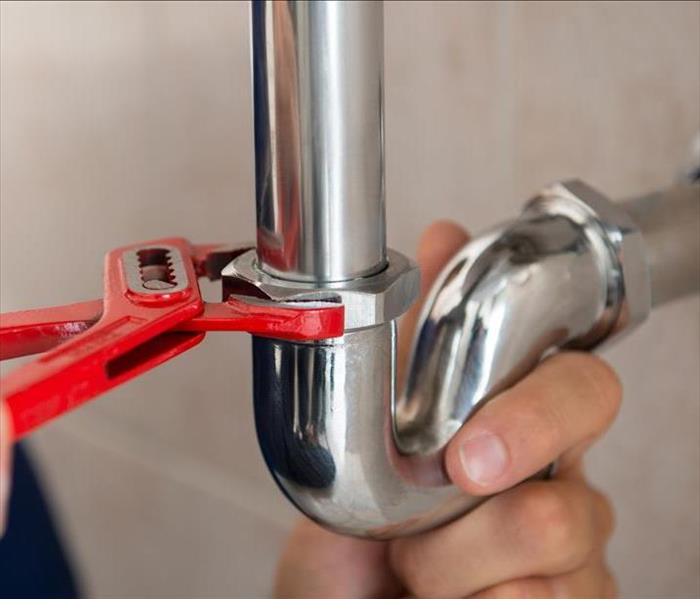 SERVPRO Suggests to Immediately Repair Any Leak in Your Weaverville Home
SERVPRO Suggests to Immediately Repair Any Leak in Your Weaverville Home
Inspect Your Weaverville Property's Water Damage Wet Spots by SERVPRO
Weaverville Water Damage is not an equal opportunity attacker. Rather, it is more likely to strike in particular rooms of your house. Learning more about where water damage is most likely to take place is important because it enables you to develop common sense plans that will prevent, or, at least, moderate, extensive property damage. SERVPRO suggests you read the following short outline regarding the four rooms that are most at risk for water intrusion:
Basement
Water always tries to seek its weakest resistance to flow by the force of gravity. Your basement is the lowest area of your property; water heaters, furnaces, and washing machines can malfunction causing water leakages. Additionally, the basement seepage can result from external forces such as a massive outdoor downpour that penetrate the walls, natural groundwater that infiltrates the basement floor, or a large scale flooding. As such, you should check your basement regularly to spot evidence of leaks or active leaks that might be occurring. Be aware of a sense of dampness or a musty odor resulting from a mold infestation.
Bathroom
The bathroom is a main intersection between drain pipes and plumbing supply lines. Plenty can go awry in this room of your property. Overflowing toilets, tubs, showers, and leaky pipes can all contribute to the onset of water damage. Additionally, the bathroom can be a zone for high humidity that triggers mold growth.
Laundry Room
The washing machine and utility sink move volumes of water. In some cases, the water supply hose could break or crack, the drain hose may dislodge from its drain exit, or the supply line may burst or pinhole. If the leakage happens while you are on vacation or out of town, the water damage could result in a flood that impacts your entire home. You should have your hoses changed every five years to stay on the safe side. Large amounts of standing water have an enormous impact on furnishings and structural materials.
Kitchen
Like your bathroom, the kitchen is a room that carries high water risk. For example, large sinks can accept and subsequently drain high volumes of water. Additionally, clogs and plumbing leaks can cause overflows and backups. Finally, ice makers and dishwashers connected to your supply lines can spill water or cause leaks. SERVPRO recommends calling a plumber or immediately fixing any leak in the kitchen. A pot to catch drips is a recipe for disaster.
Let the SERVPRO Water Damage Restoration Experts Assist You.
Although recognizing which rooms of your home are at a significant risk of water damage is important, this does not mean that you will always be able to prevent a problem from occurring. If you do experience water damage, there's only one company to call for Weaverville water damage restoration services: SERVPRO. Our IICRC-certified technicians are ready to assist you 24/7 with any water intrusion or storm emergency. From water removal to final walk-through, we guarantee our services to your complete satisfaction. "Like it never even happened."
We’re Highly Trained Water Damage Specialists
SERVPRO of Asheville East specializes in water damage restoration, the cornerstone of our business. We have extensive water damage restoration training, and our process emphasizes regular monitoring and documentation of the drying process from beginning to end. We are part of the local communities of Weaverville, Black Mountain, and Asheville and we can help 24/7. Call us at (828) 255-4535
Four Ways Water Damage Adversely Impacts Your Property's Foundation in Black Mountain
11/11/2015 (Permalink)
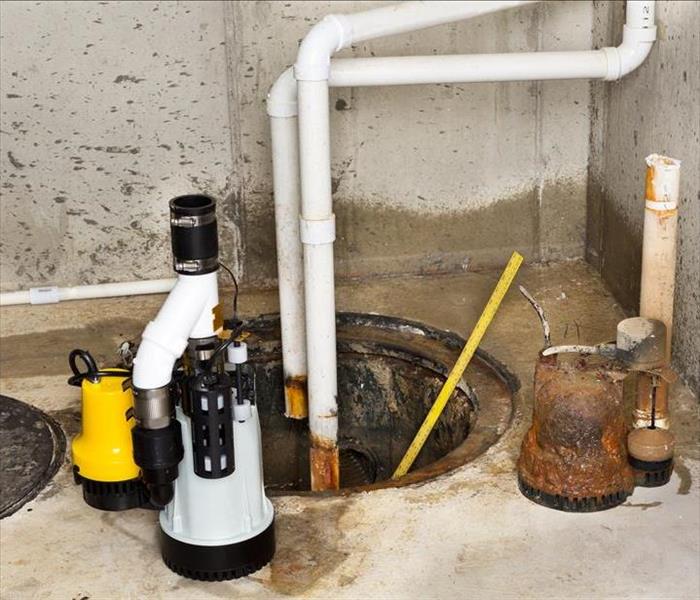 Sump pump is First Line of Defense for Basement Water Damage
Sump pump is First Line of Defense for Basement Water Damage
SERVPRO Can Restore Your Black Mountain Foundation After Water Damage
One of the worst issues a residential property owner in Black Mountain may have to grapple with is water damage. Although water damage can adversely impact any region of the property, the damage that can be done to the home's foundation is particularly problematic. Learn more about the problems that water damage can cause to your home's foundation by reviewing the following information provided by SERVPRO:
1. The saturated soil located near your home's foundation walls can leak or wick into the walls of the basement. After the basement or foundation site is excavated and the foundation flooring is poured, the builders construct the exterior walls. They will back-fill soil into the cavity surrounding the outside walls. This soil will not become as compacted as the property's adjacent soil. Moreover, it will soak up the water nearby. After rainfall, water pressure can push the walls of the foundation inward and also cause them to crack or leak.
2. Water is capable of washing nearby soil from beneath and around your foundation. Specifically, many homes and garages are designed over concrete slabs, and if a slope that drains water away from the property's foundation is not created, the soil can wash away. As the water continues eroding the soil located beneath the property's foundation, it will start to crack and can even sink, like a minature sink-hole. Septic tank black water may seep into the structure.
3. Water damage can be problematic for homes in which the basement is built in a region where the amount of clay located in the soil is significant. This is the case because clay retains water more effectively than other types of soil. Because the clay expands upon absorbing moisture and then contracts when it dries out, the result is pressure changes that destabilize the structural integrity of the property's foundation wall and flooring.
4. Water, sufficient water moisture or vapor located close to the sill plate, studs, or siding near the foundation can cause wood rot. This may also result in rotting of floor joists in crawl space construction. As these fungi attacked and softened the cellulose building materials, a conducive condition for a subterranean termite attack is viable. The result is the rotting and loss of structural strength of the wood. So, clay that retains moisture affecting exterior wall and slabs, and crawl space foundations absorbing water into floor joists, piers, and single or double pine flooring, can all lead to water damage.
Dormant mold spores, present in all Black Mountain houses, have the moisture, along with the cellulose food source, to begin to grow string--colonies. These molds can now proliferate into large mold patches damaging furniture, drywall, and infiltrating your HVAC system. Health issues arise from inspiring fungi's mycotoxins into your lungs.
Let The Professionals Of SERVPRO Assist You. As explained by the information listed above, water damage in Black Mountain can have a profoundly negative impact on your home's foundation and structure. However, securing professional water damage restoration services can help you address and resolve the problem before it gets too widespread. Our team can be trusted for immediate, effective restoration services. SERVPRO employs IICRC-certified technicians, who also receive additional training in all aspects of water damage remediation. Call us for advice on how to protect your foundation, or call us to restore any water damage problems.
Locally Owned and Operated
We live and work in Black Mountain too; we might even be neighbors. As a locally owned and operated business, SERVPRO of Asheville East is close by and ready to respond to your water or flood damage emergency. Call us for help. (828) 255-4535
Nine Sources Causing Water Damage in Asheville
11/8/2015 (Permalink)
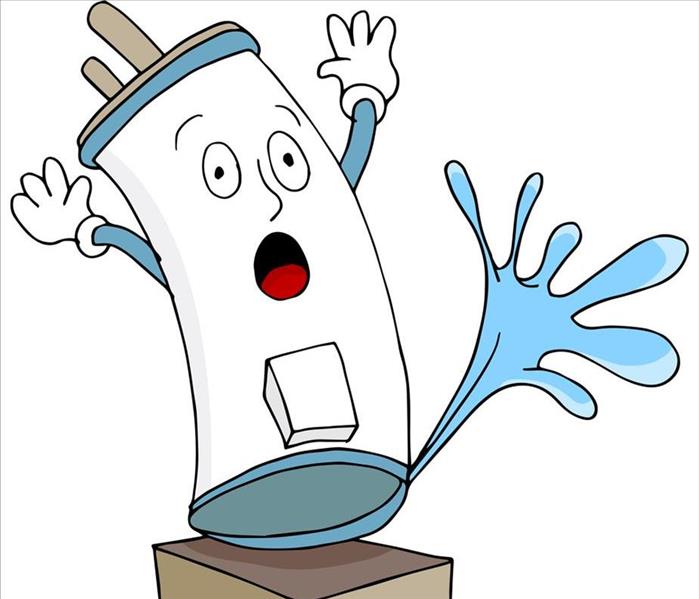 Water Heater Sprung a Leak, Call SERVPRO
Water Heater Sprung a Leak, Call SERVPRO
SERVPRO Can Protect Your Asheville Home from Water Damage
Residential property owners in Asheville can find themselves dealing with a wide range of home maintenance issues resulting in water damage. Water leaks can be not only an irritant but also inconvenient and expensive. However, understanding more about where water leaks tend to take place can empower you to prevent them. To get the information you need regarding this important matter, SERVPRO suggests you review the short outline provided below:
Where Do Water Leaks Take Place? As many water damage restoration experts know, water leaks can happen in numerous places within the home setting. However, there are several places where water leaks are particularly prevalent. Here are nine of them:
1. Washing Machines. Washing machines are hotbeds for leaks. The drain hose, usually anchored to a wall and the supply lines located behind the washing machine can rupture at any time.
2. Water Supply Lines. The plumbing system within your home operates under water pressure ranging from 40 to 60 p.s.i. Be sure to check periodically for water pooling under sinks. Know where your main water line cut-off valve is located.
3. Water Heaters. When your water heater tank fails, your entire home could flood. Luckily, the tank failure is typically preceded by signs indicating minor leakages, such as rusting around the supply lines or lower base of the tank. Set the tank in an overflow safety pan.
4. Commodes. If your toilet becomes clogged, turn off the water supply to prevent overflowing by continual flushing. Try using a plunger to remove the debris before calling a plumber.
5. Sewer/Sump Pump. A sewer blockage can send raw sewage (black water) into your residential space in Asheville. The sewage will typically gravitate to the lower drains of your basement. E Coli and other contaminants must be removed and the area professionally sanitized. SERVPRO has the experienced technicians, equipment, and chemical products to ensure the rturn of cleanliness and safety of your home.
6. Heavy Appliances. Refrigerators can become the source of water leaks if the ice maker line ruptures. Additionally, the dishwasher's supply line can leak, or the drain line may disconnect from the sink drainage pipe and go unnoticed for an extended period. Check frequently for moisture accumulation under the kitchen sink.
7. Sinks And Showers. Missing caulking or grout can enable water to slip through your shower and tub enclosures into the walls creating a conducive condition for mold growth. Additionally, faucets are prone to wearing out. Replace or fix these taps before a drip becomes a serious leak.
8. HVAC Equipment. Drain line clogs in your air conditioning unit can cause overflow water leakage. Have a micro switch installed to activate a small pump in the air-handler catch pan for water removal. Utilize algicides to prevent clogging and a maintenance schedule for your entire system.
9. Gutters. Gutters and downspouts may need leaf-catchers to ensure proper rainwater drainage. Inspect for debris and eliminate the potential of structural damage to trusses, fascias, and soffits
Let SERVPRO Fix Your Water Leak Challenge
The IICRC-certified technicians of SERVPRO are here to assist you. If your Asheville home requires service to rectify water damage call us. Our technicians have extensive industry experience, training, and equipment to return your property to pre-water damage condition. With over 55 years of experience and 1,650 franchises, our great reputation and expertise speak for itself. Our goal is your complete satisfaction.
Locally Owned and Operated
We live and work in Asheville too. As a locally owned and operated business, SERVPRO of Asheville East is close by and ready to respond to your water or flood damage emergency. We are proud to be an active member of the Asheville, Black Mountain, and Weaverville communitues and want to do our part to make our community the best it can be. Call us for help. (828) 255-4535






 24/7 Emergency Service
24/7 Emergency Service

